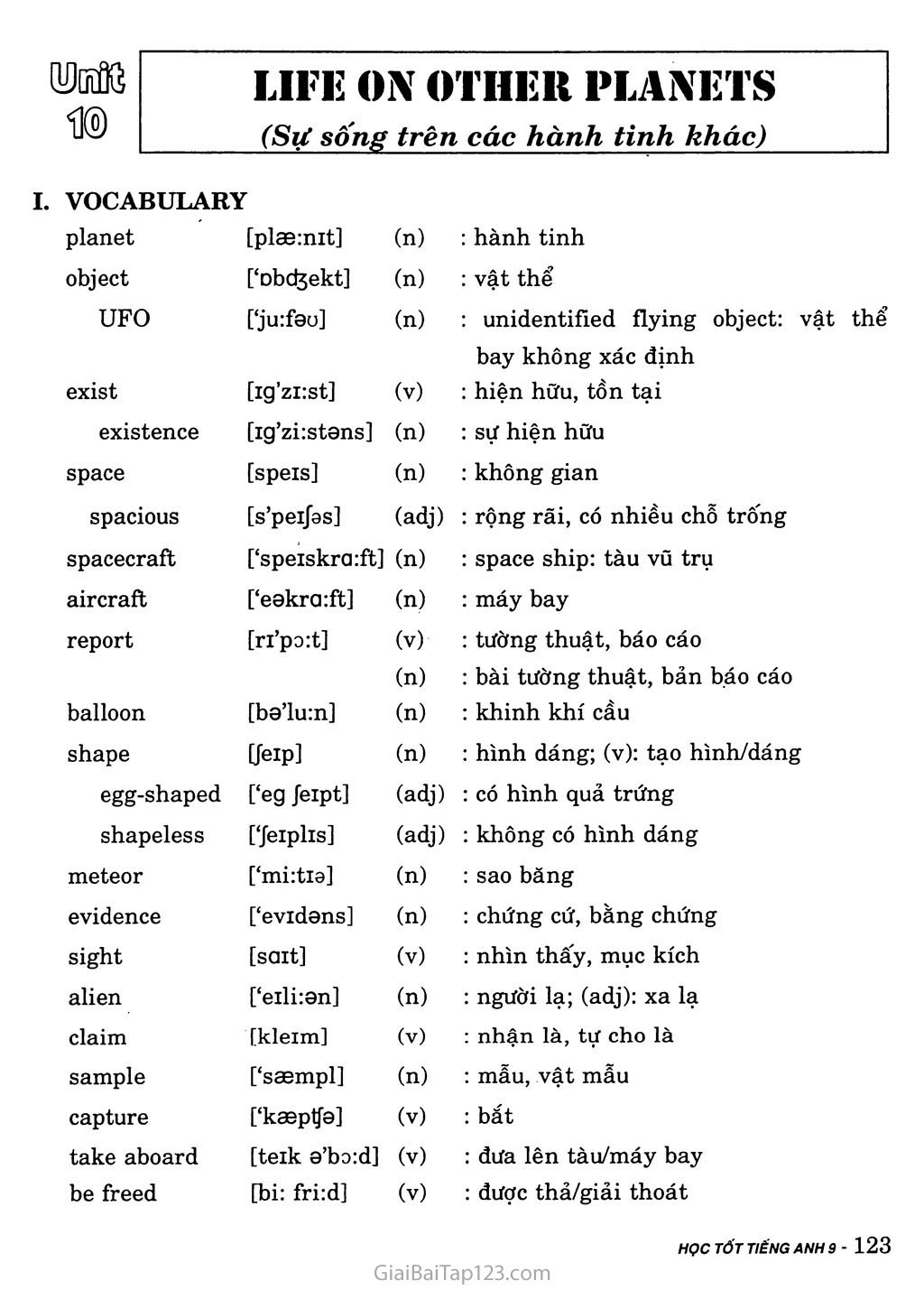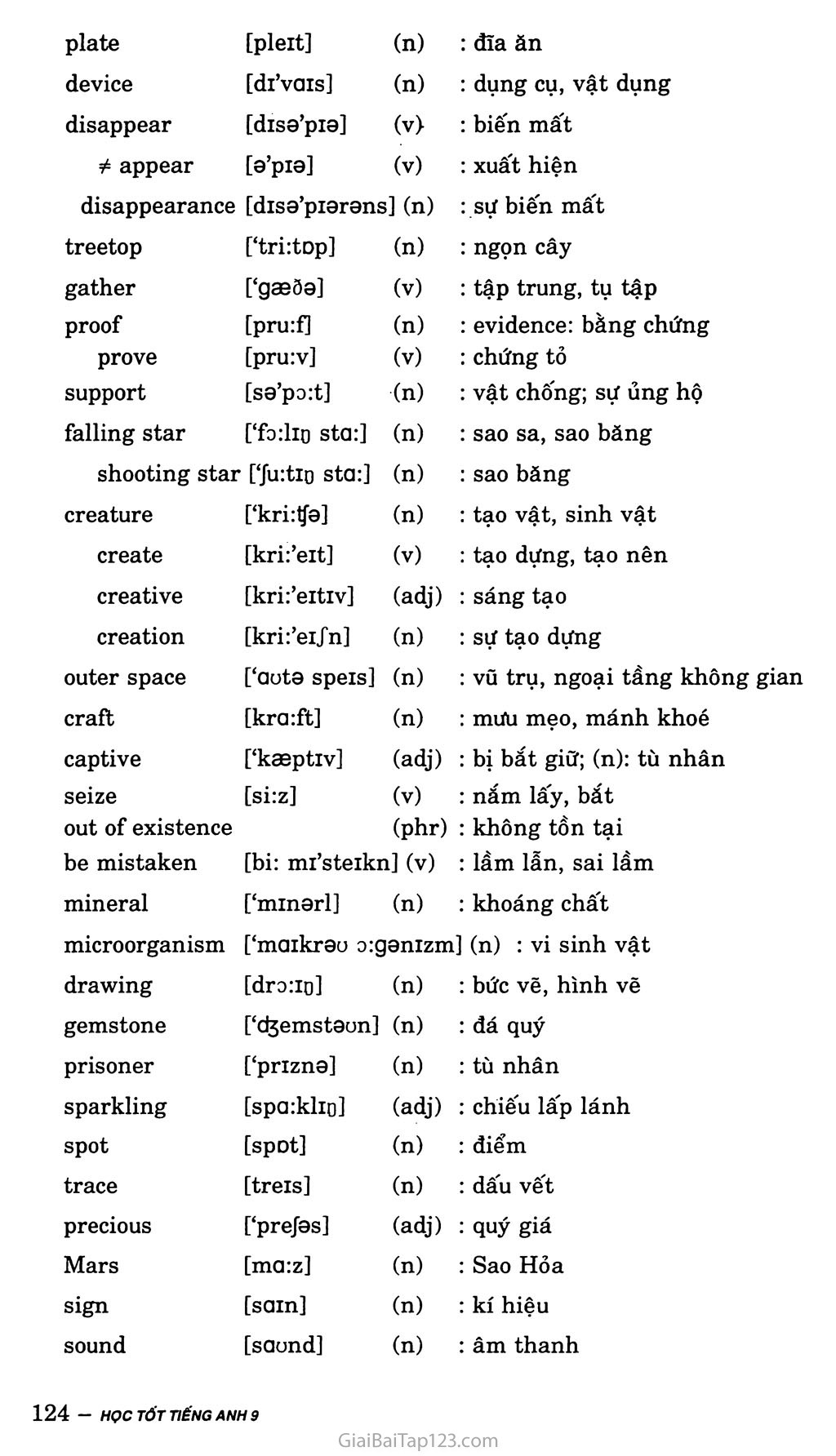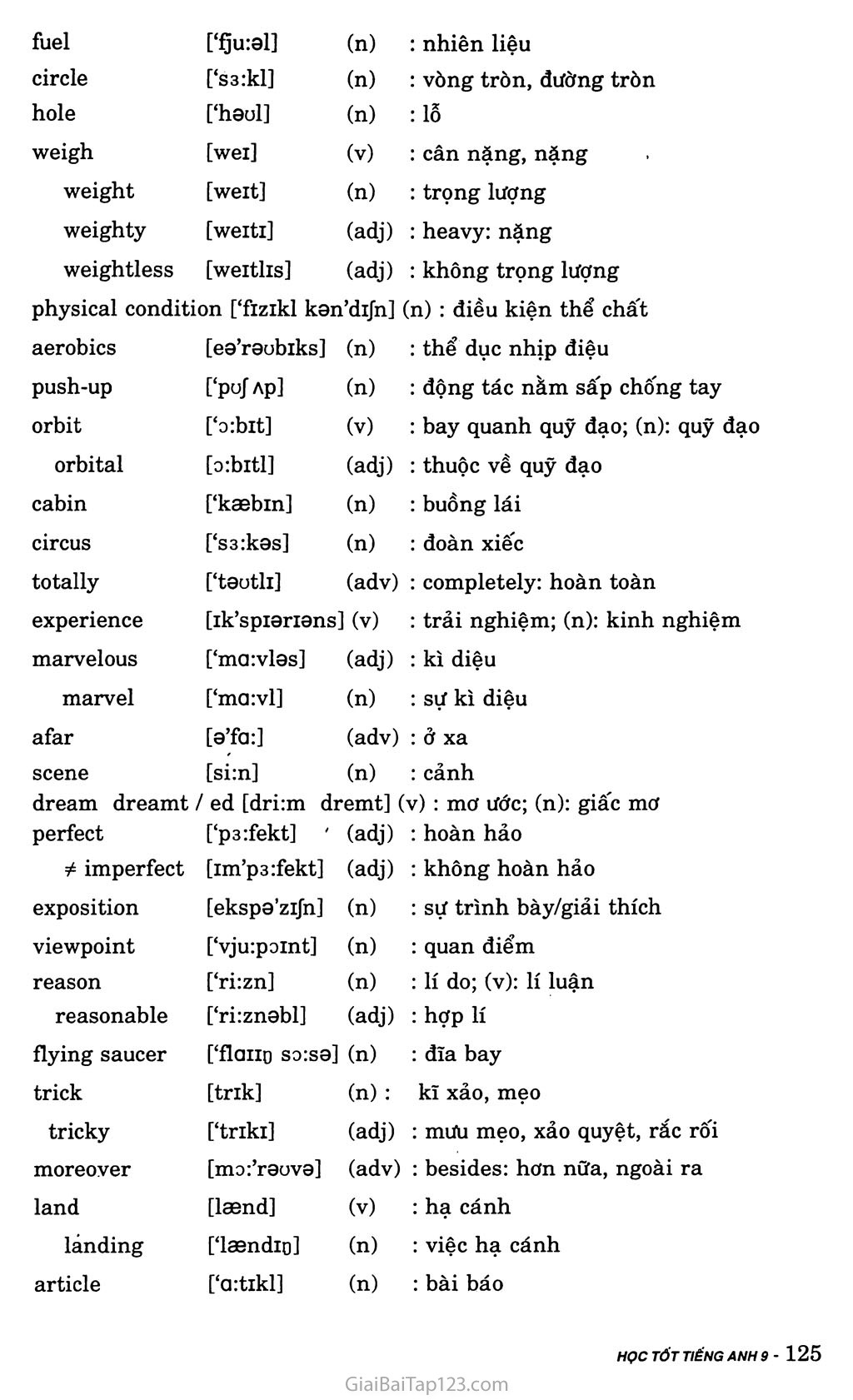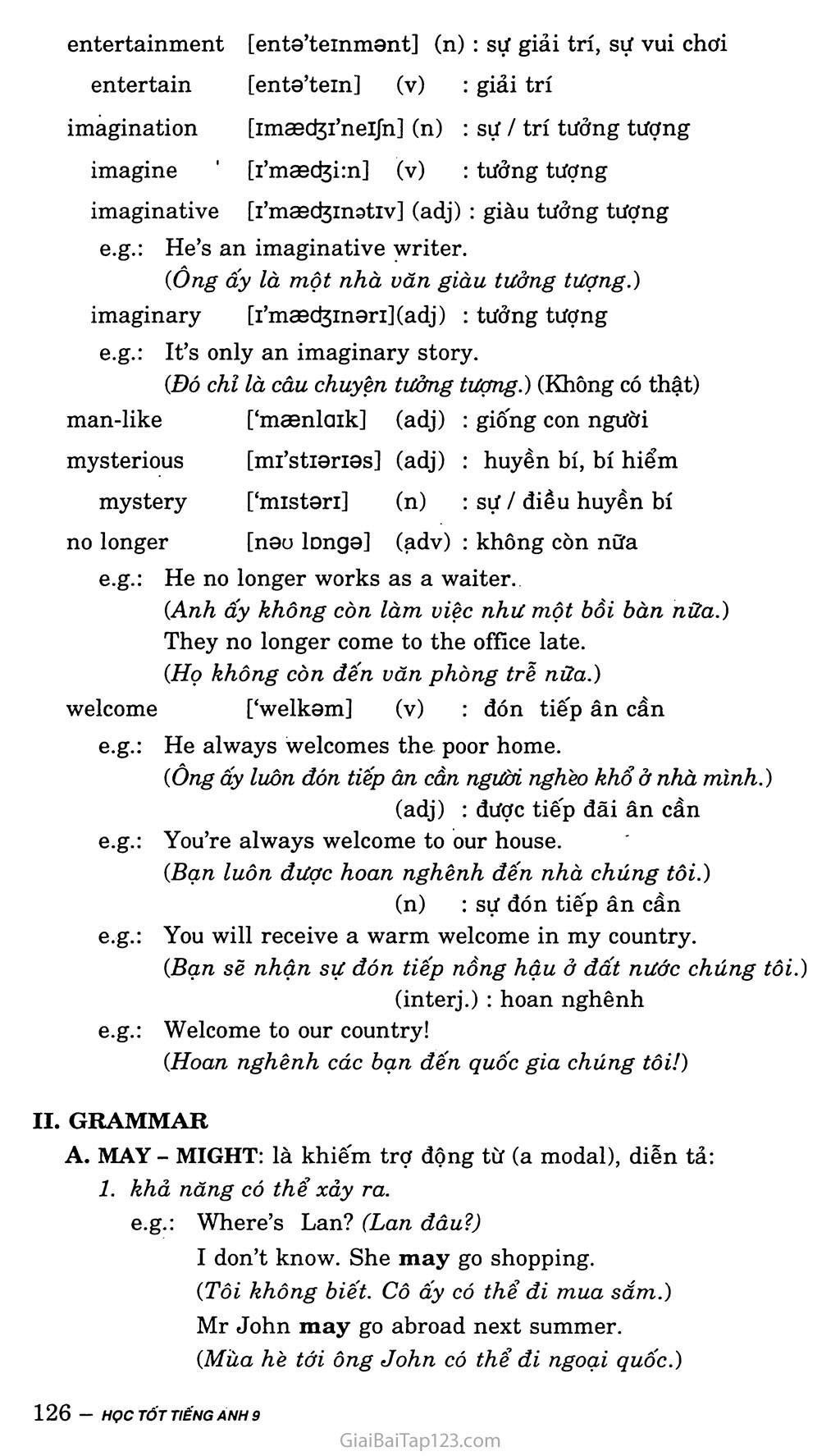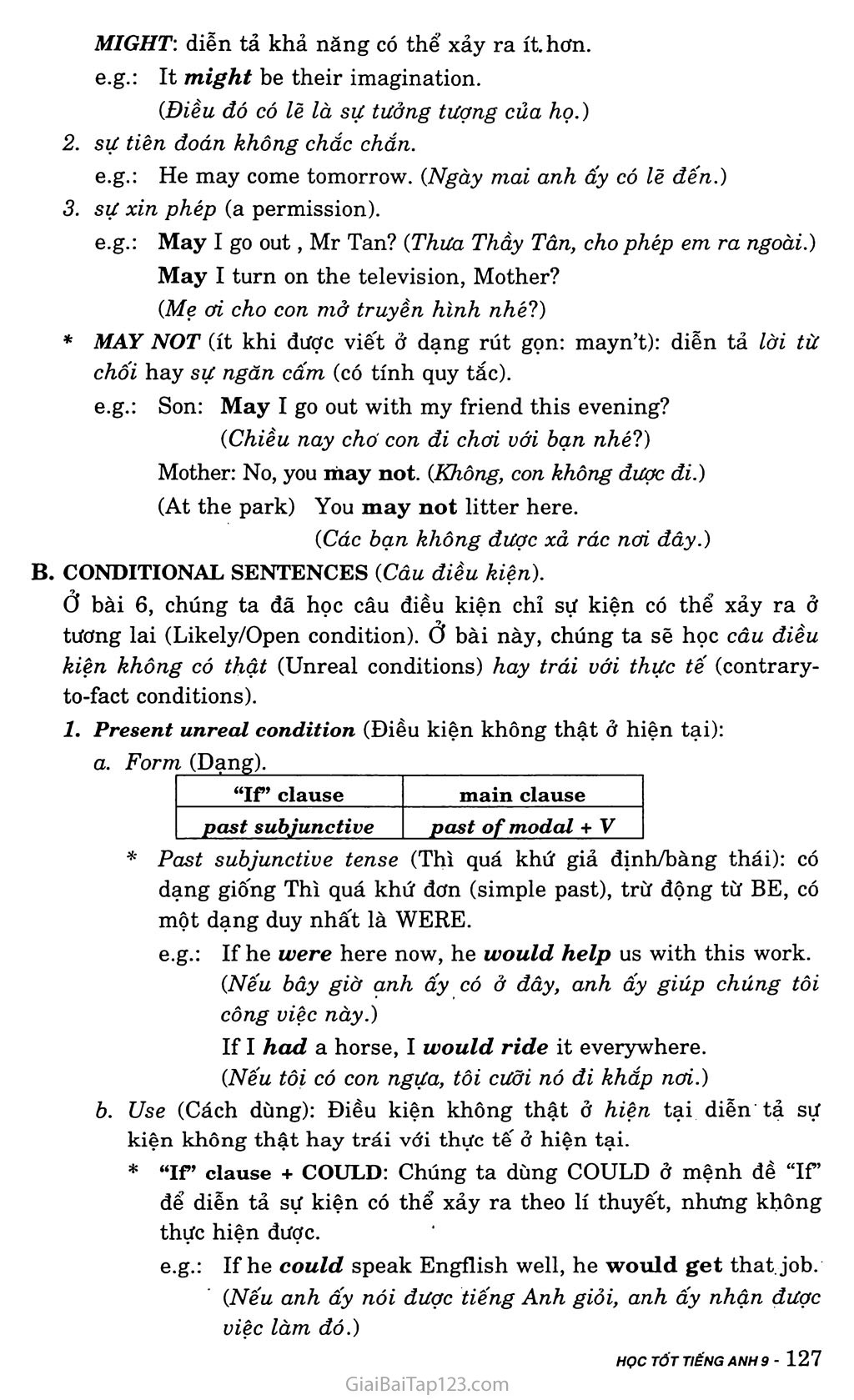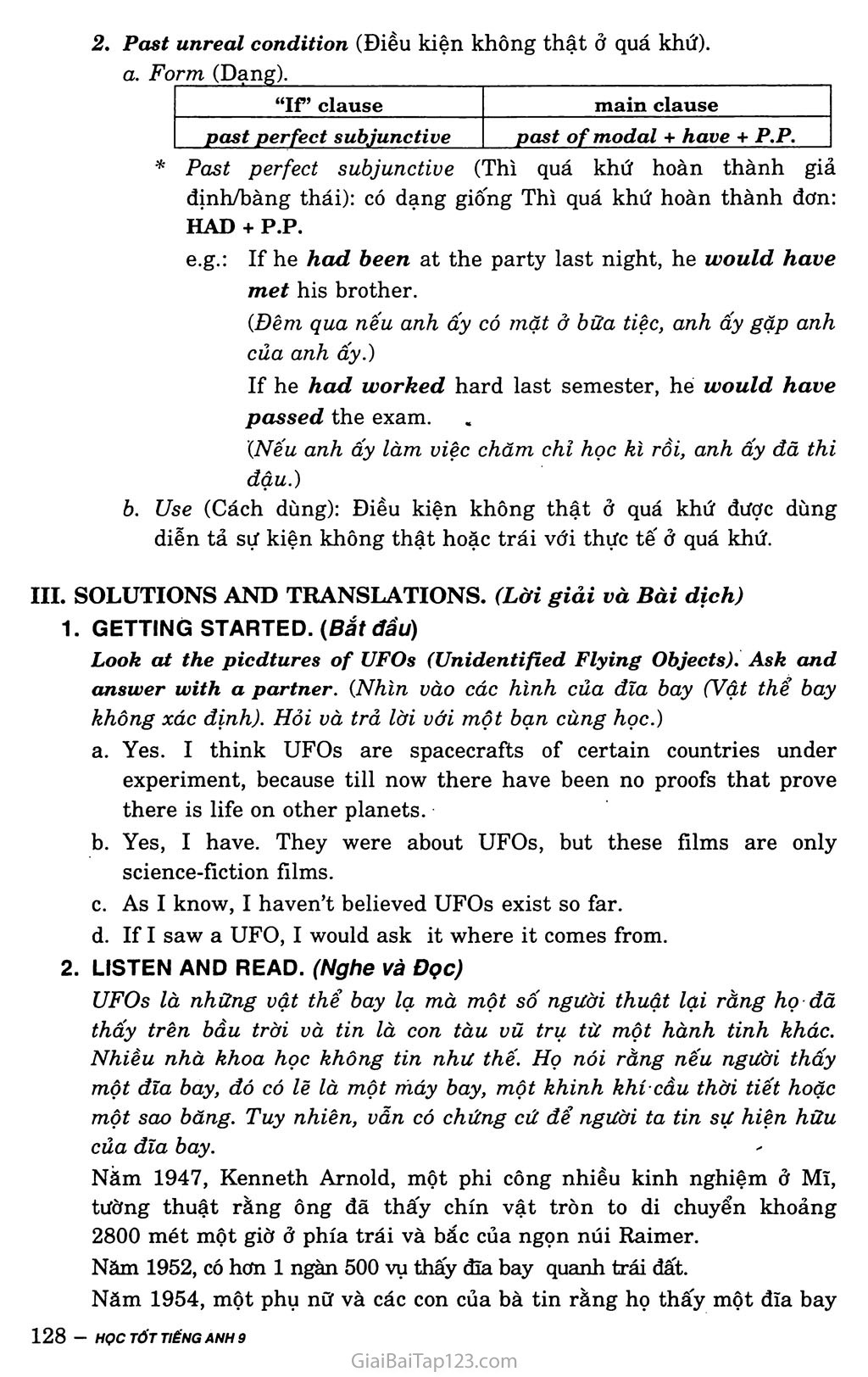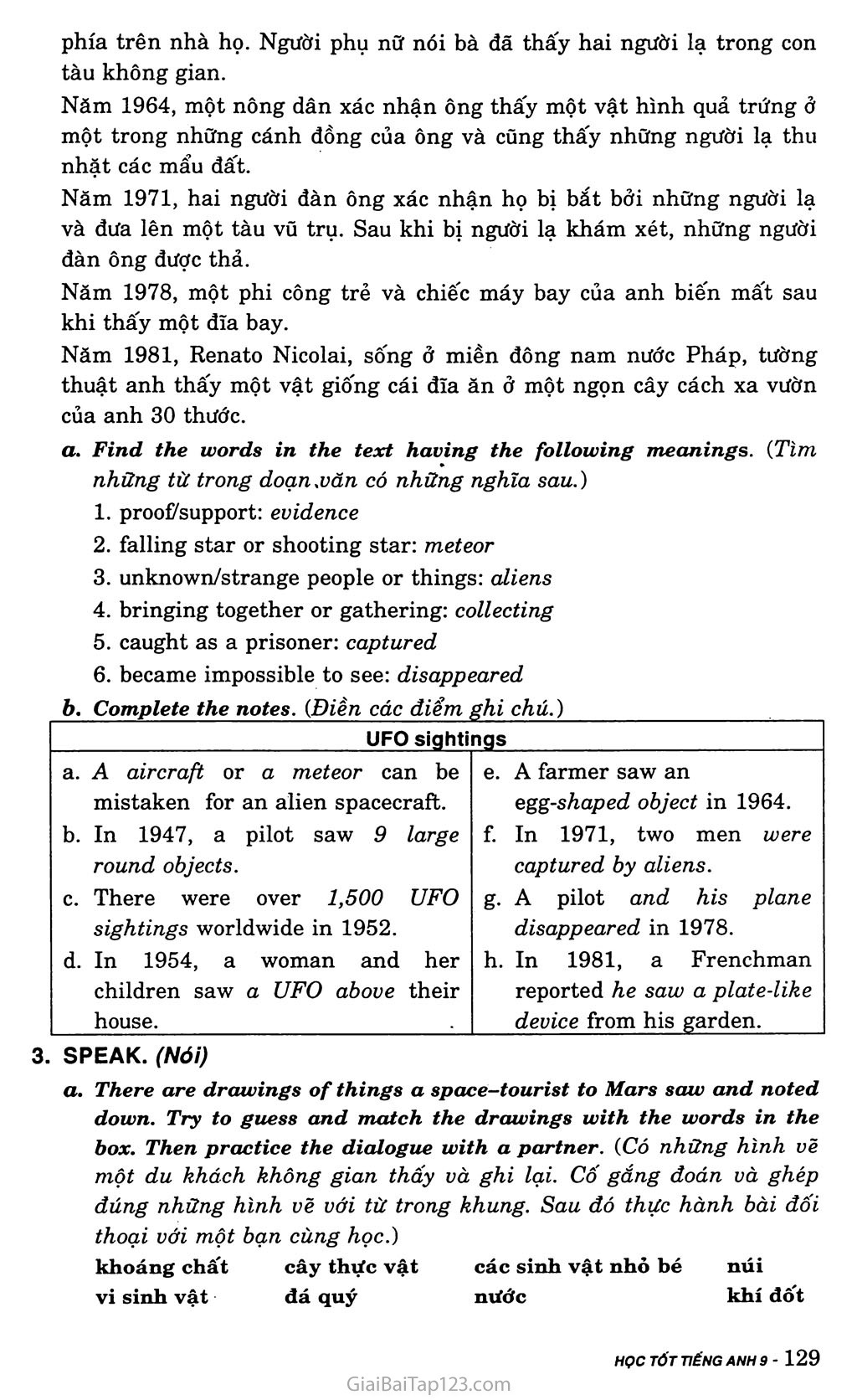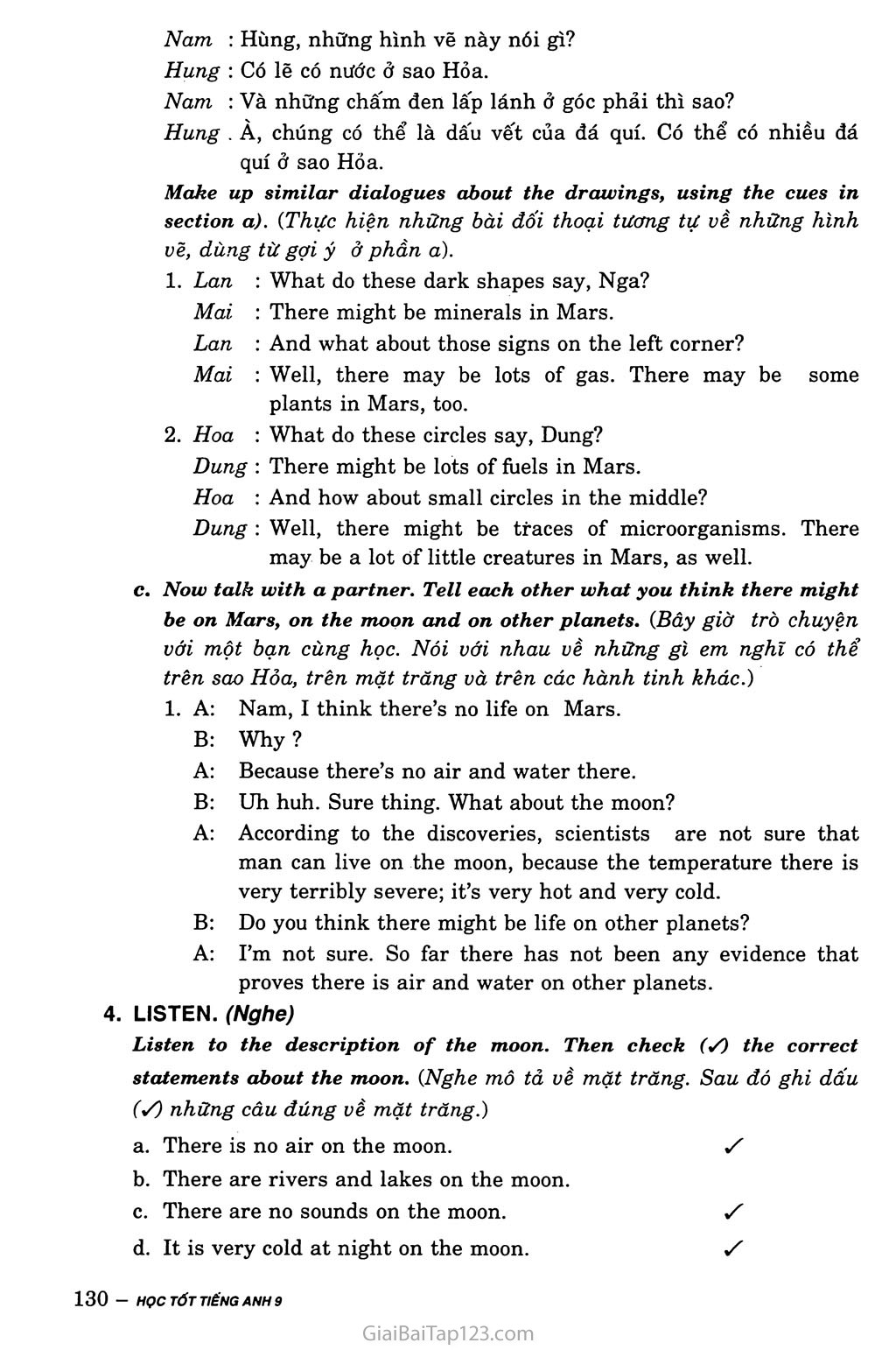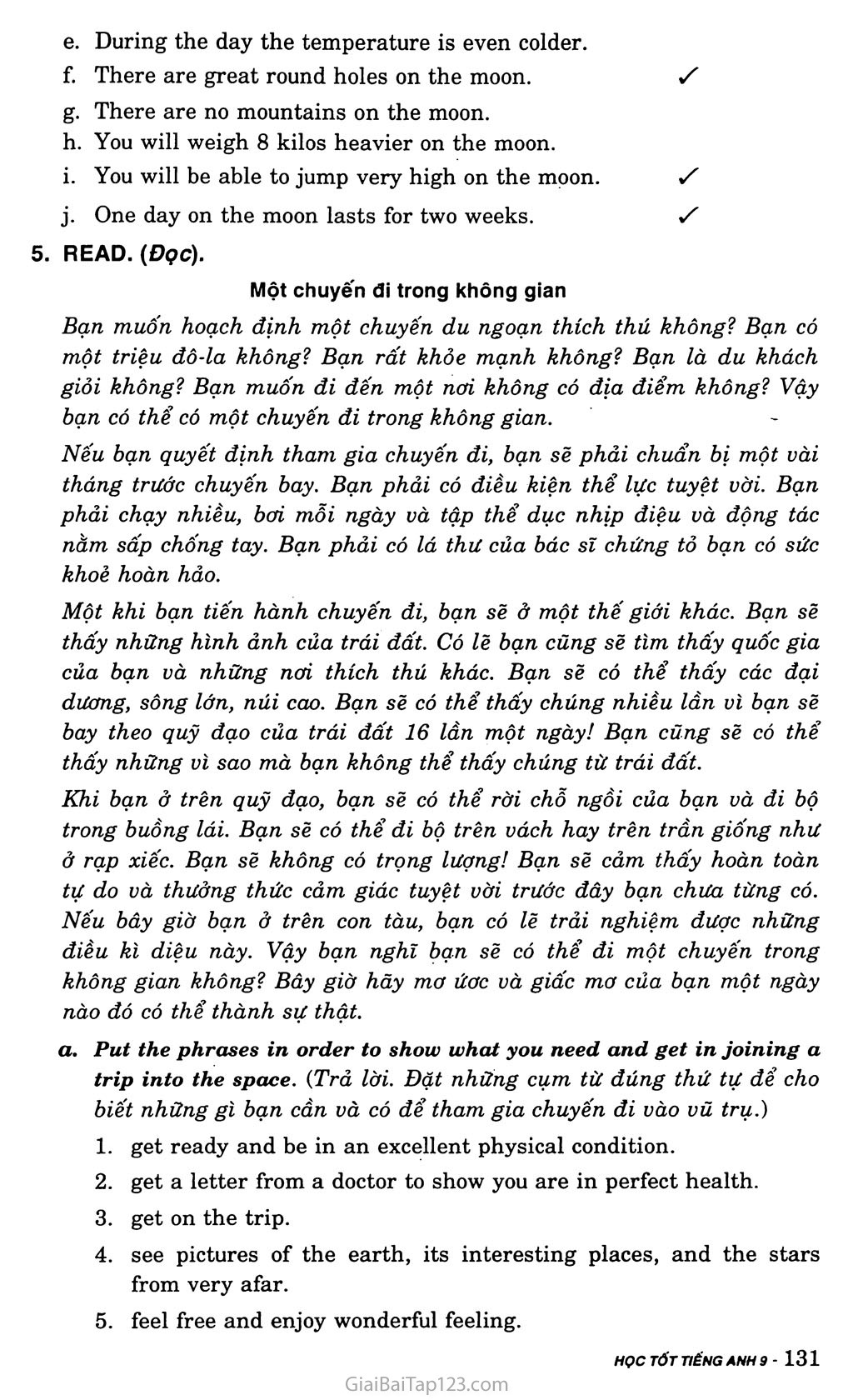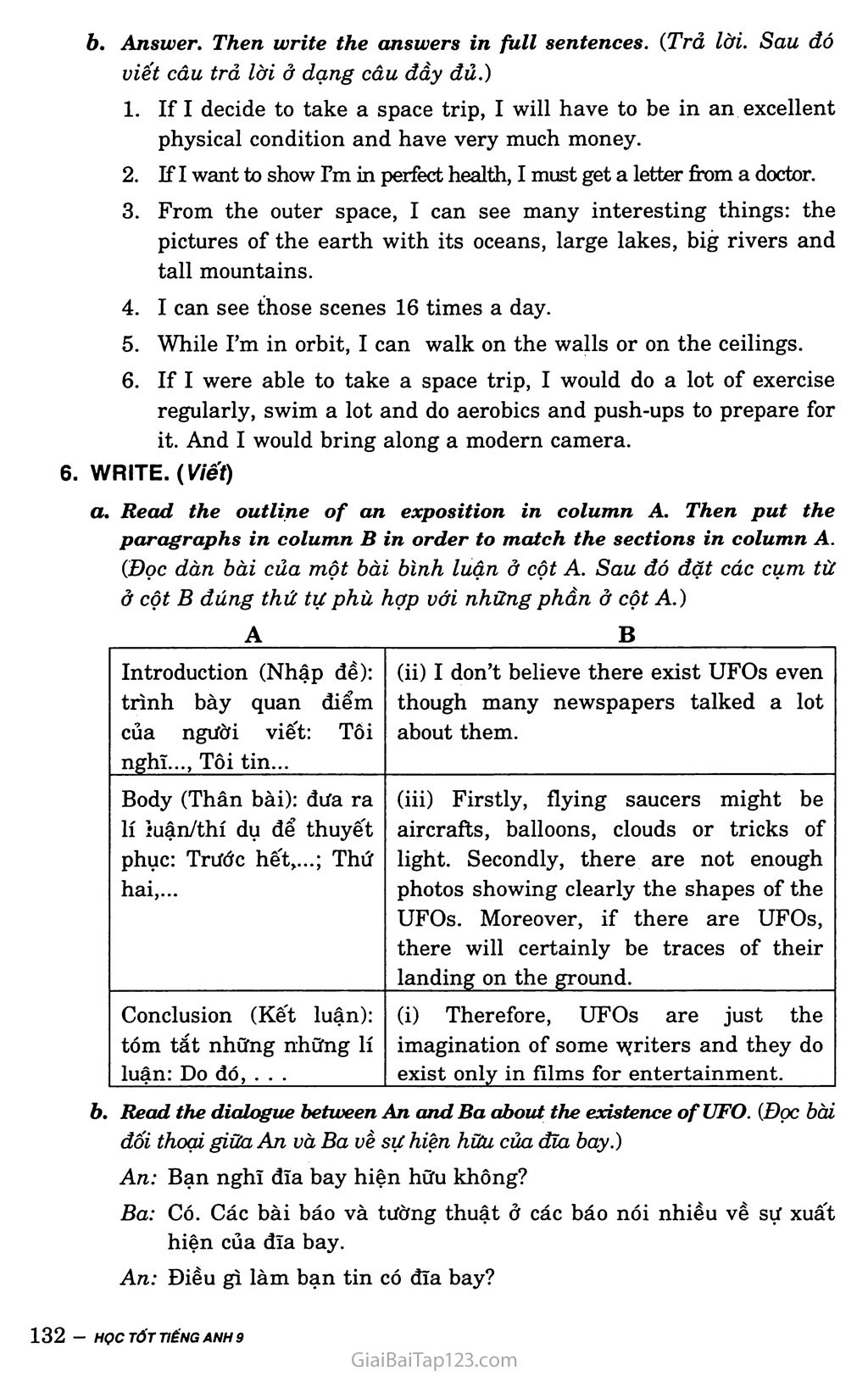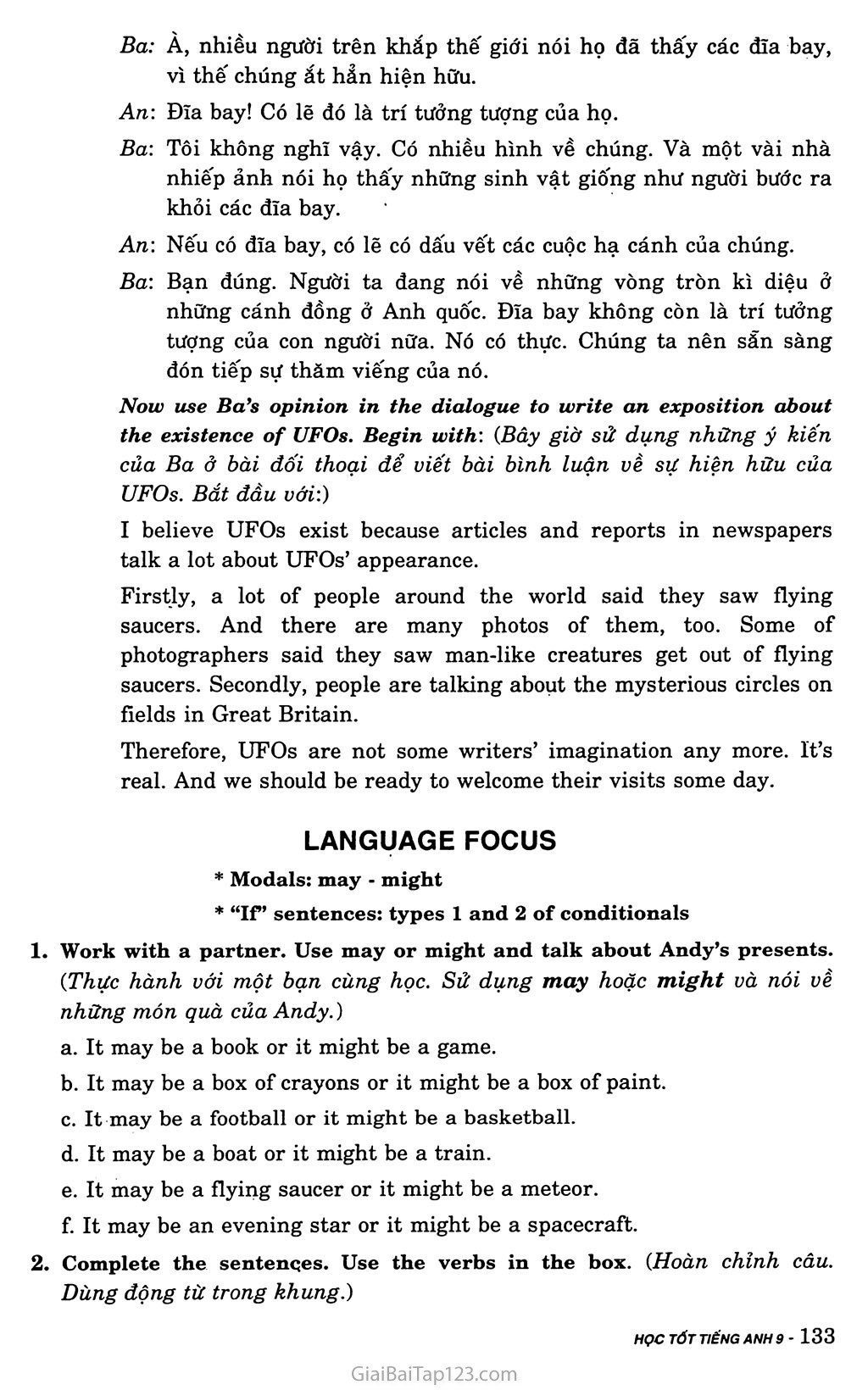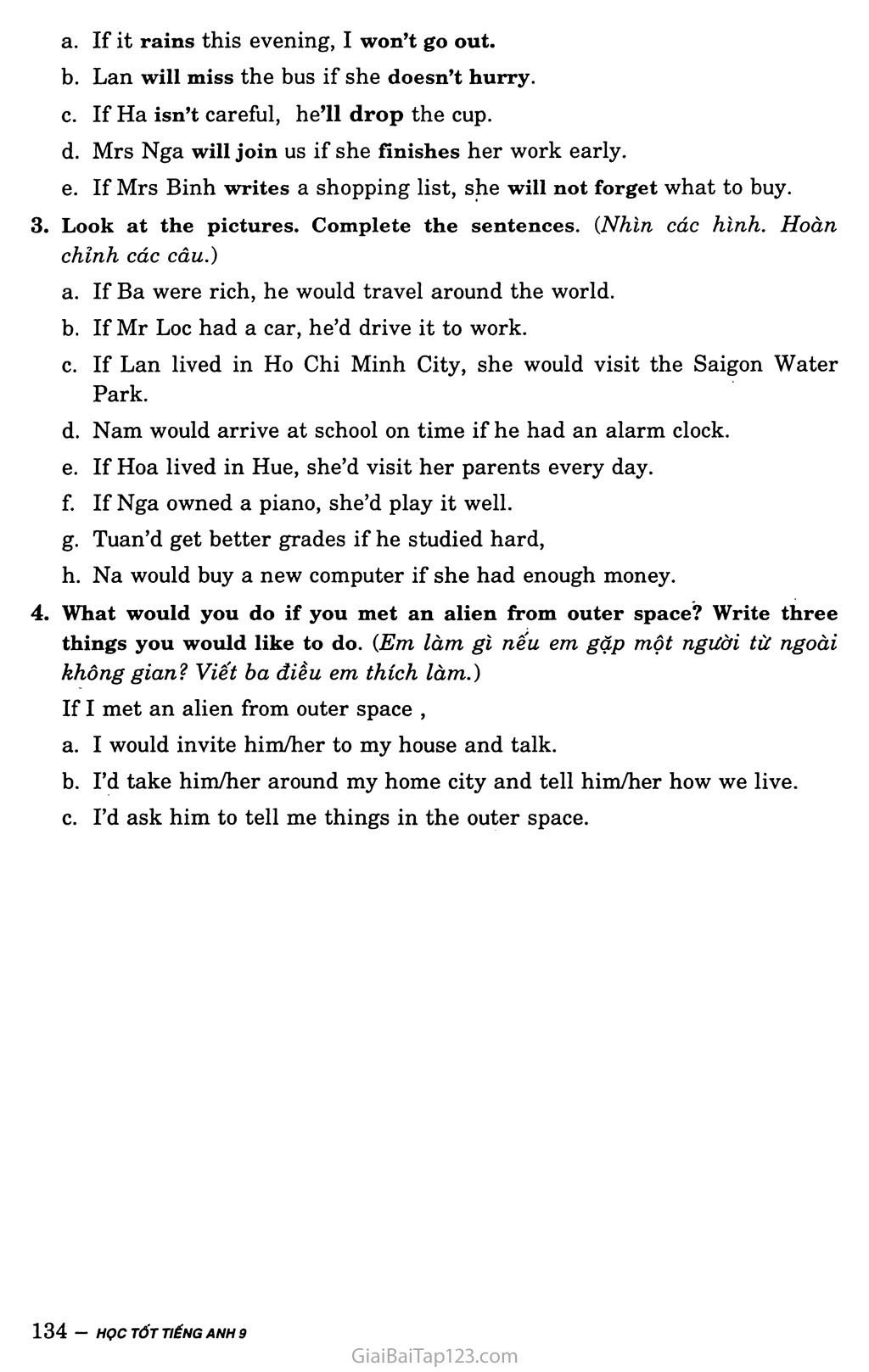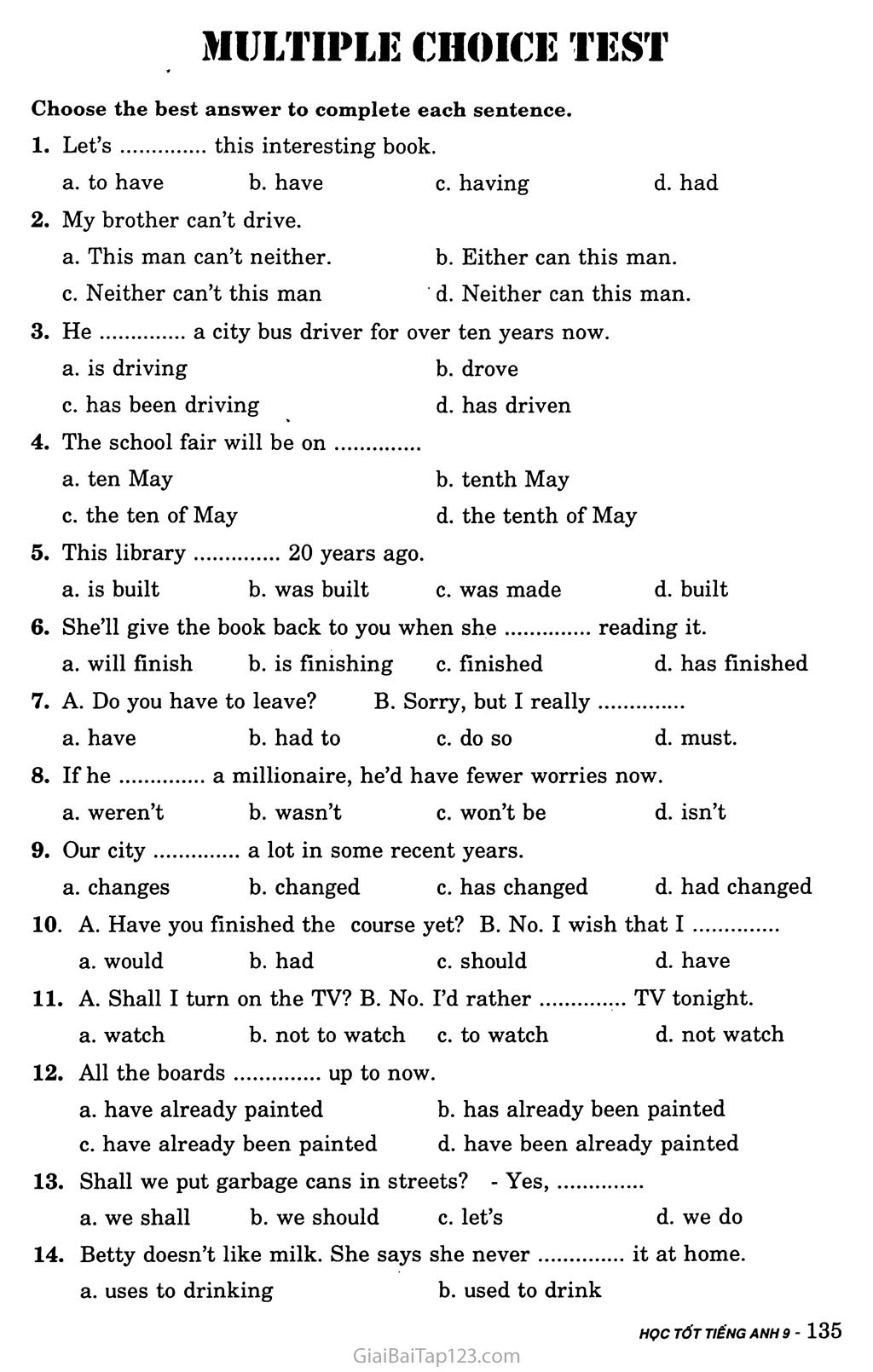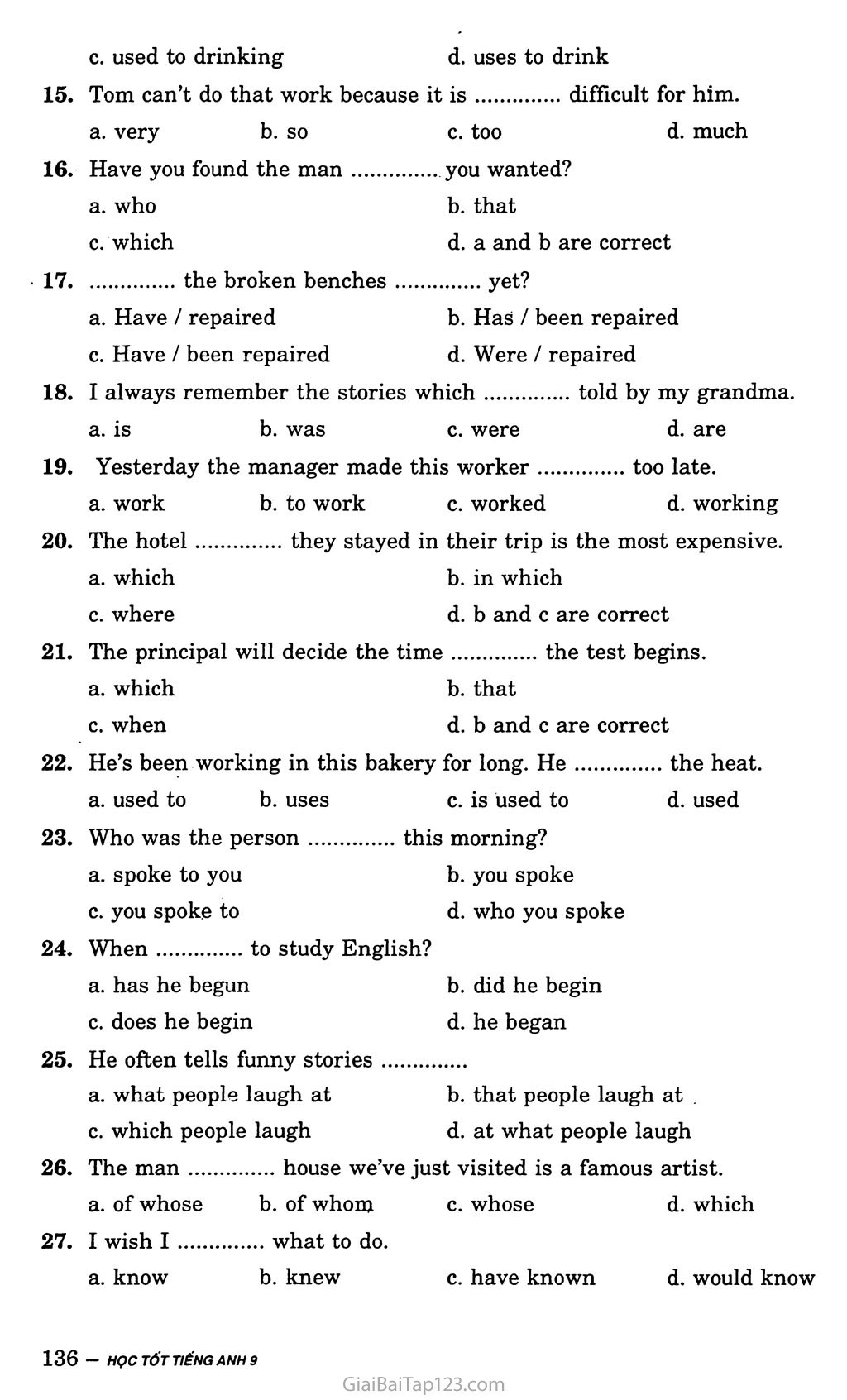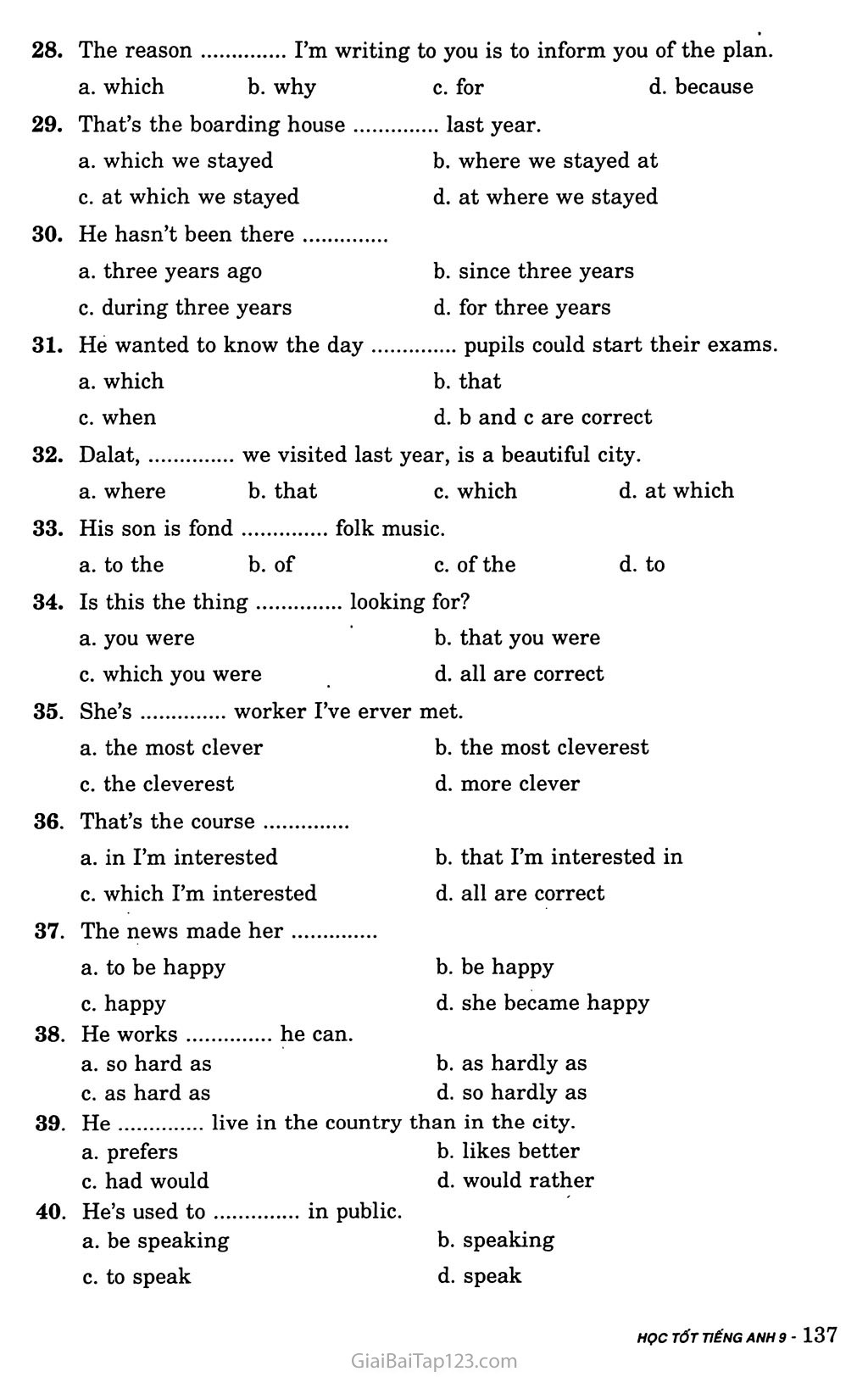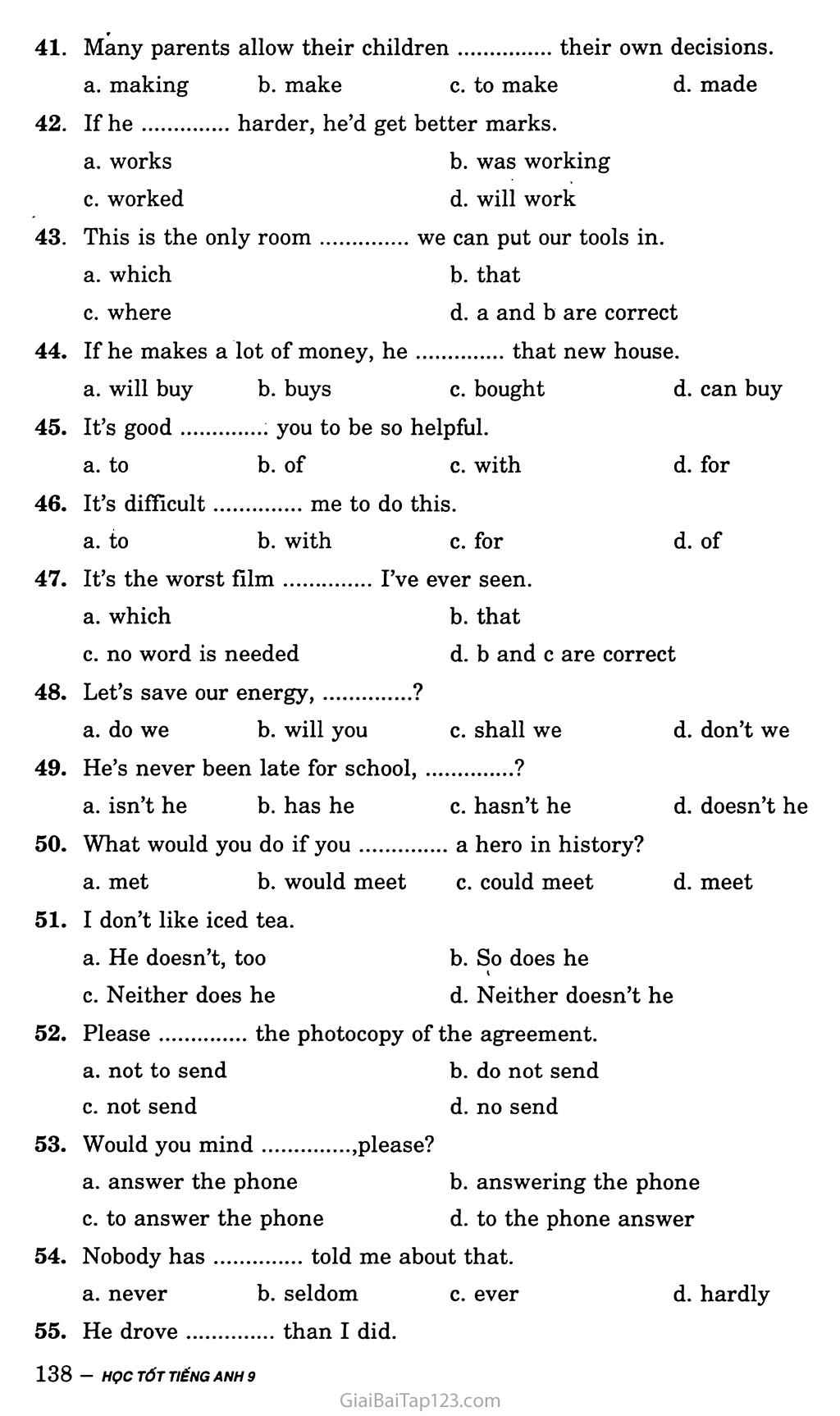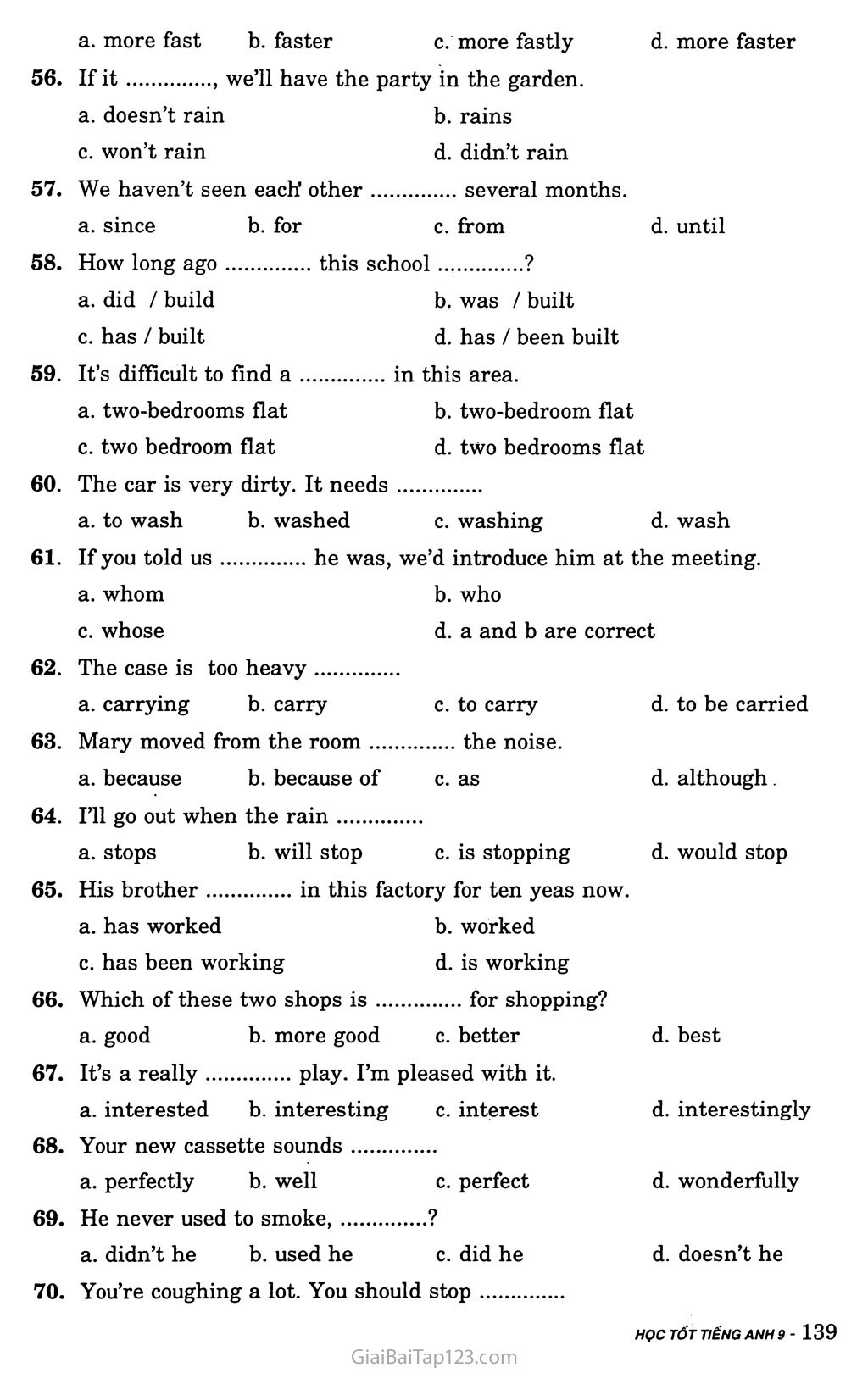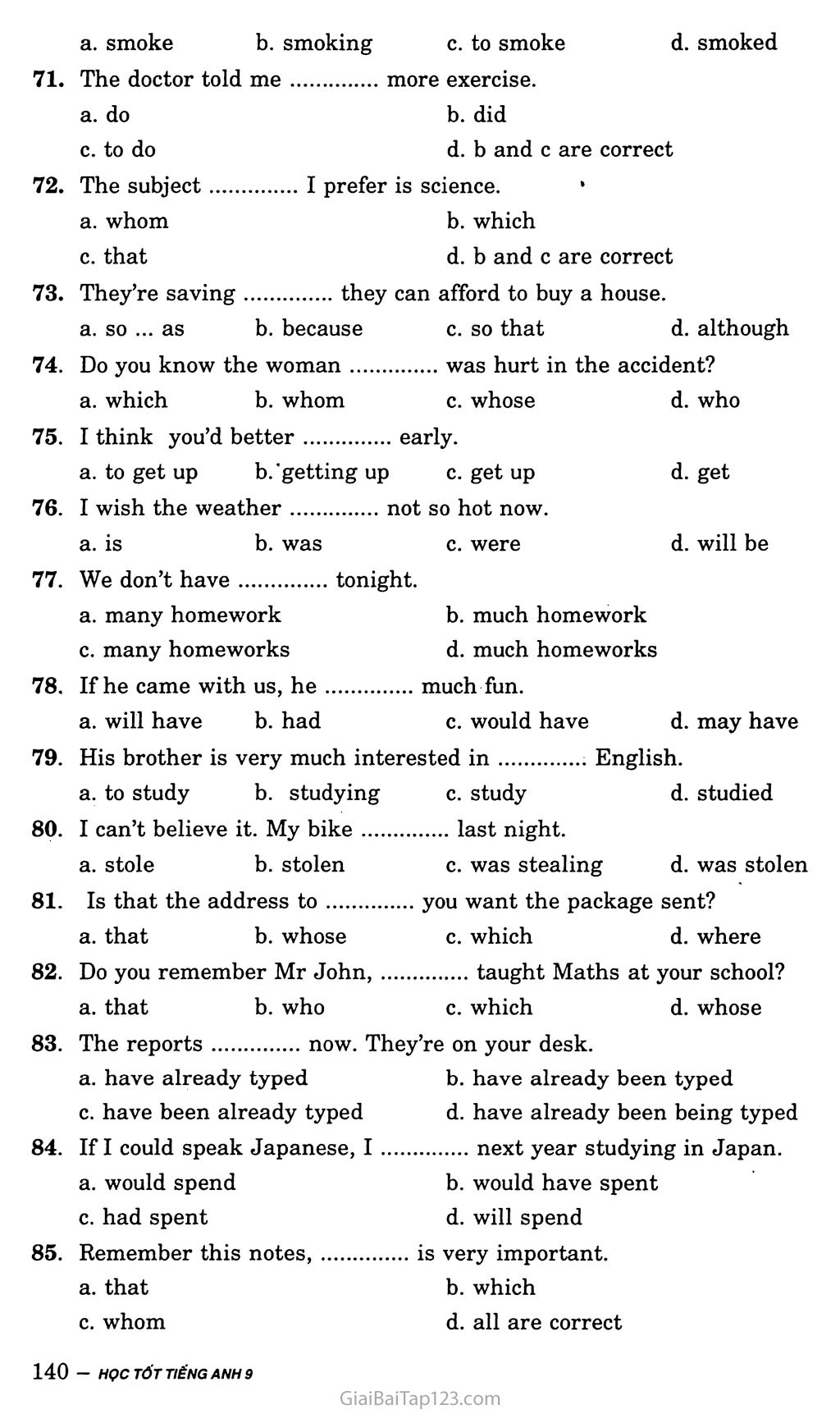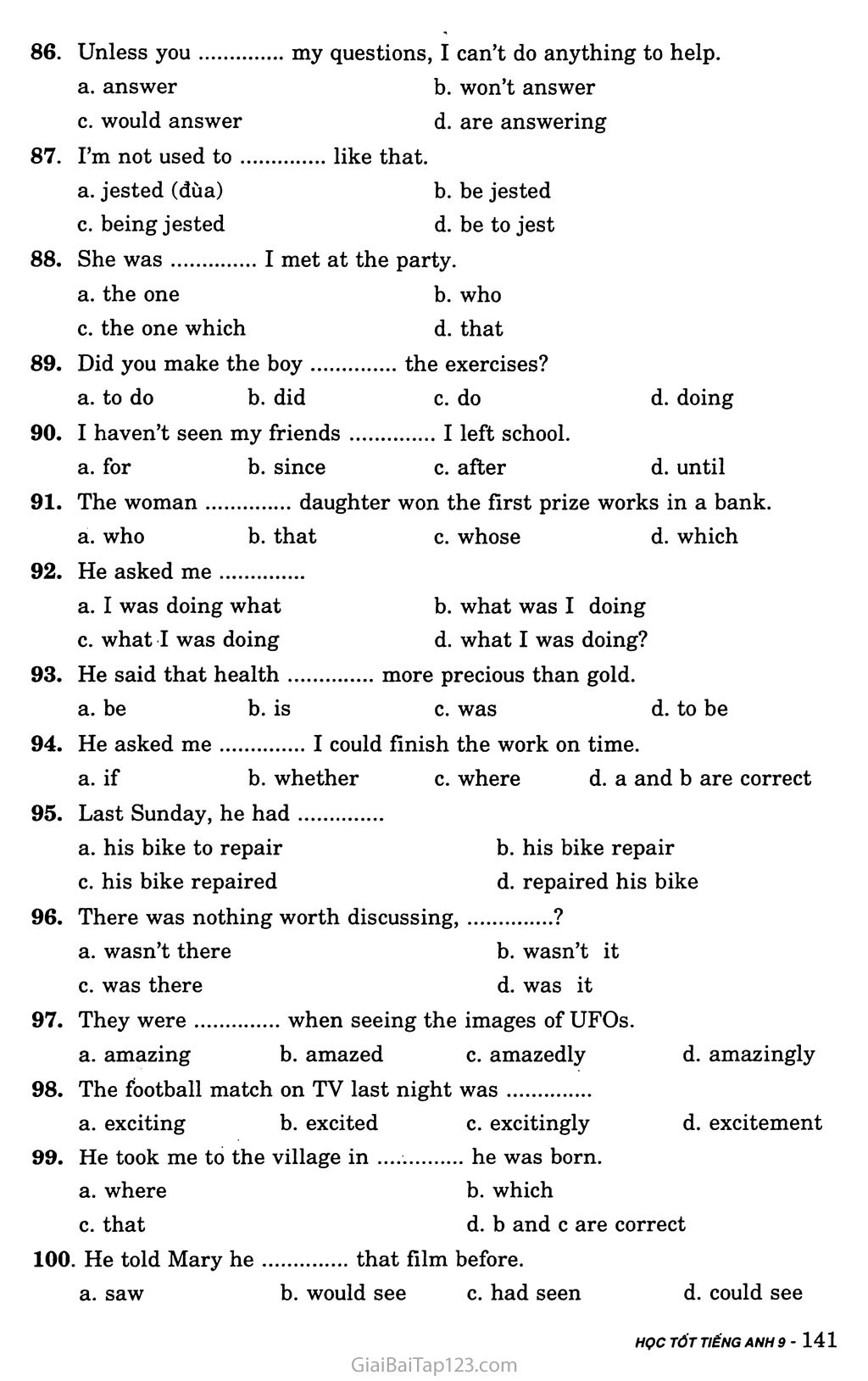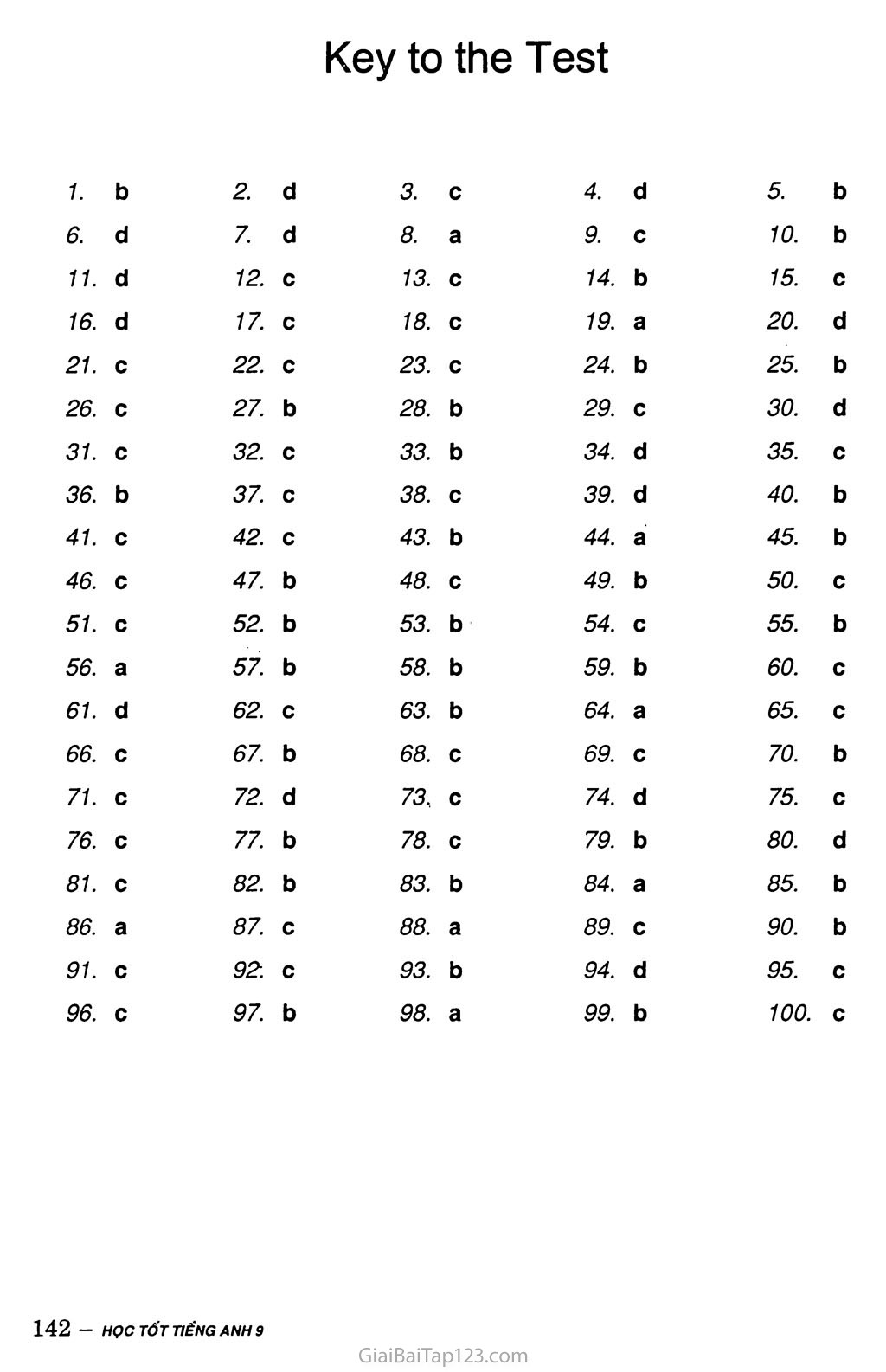Giải tiếng Anh lớp 9 Unit 10: Life on Other Planets
C5K8S
i®
LIFE ON OTHER PLANETS
(Sự sống trên các hành tinh khác)
VOCABULARY
planet
[plse:nit]
(n)
: hành tinh
object
[‘Dbc^ekt]
(n)
:vật thể
UFO
[‘ju:f90]
(n)
: unidentified flying object: vật thể bay không xác định
exist
[ig’zrst]
(v)
: hiện hữu, tồn tại
existence
[ig’zi:stans]
(n)
: sự hiện hữu
space
[speis]
(n)
: không gian
spacious
[s’peijas]
(adj)
: rộng rãi, có nhiều chỗ trông
spacecraft
[‘speiskra:ft]
(n)
: space ship: tàu vũ trụ
aircraft
[‘eskra:ft]
(n)
: máy bay
report
[ri’po:t]
(v)
(n)
: tường thuật, báo cáo : bài tường thuật, bản báo cáo
balloon
[be’lurn]
(n)
: khinh khí cầu
shape
[Jeip]
(n)
: hình dáng; (v): tạo hình/dáng
egg-shaped
[‘eg Jeipt]
(adj)
: có hình quả trứng
shapeless
[‘Jeiplis]
(adj)
: không có hình dáng
meteor
[‘mi:tia]
(n)
: sao băng
evidence
[‘evidsns]
(n)
: chứng cứ, bằng chứng
sight
[salt]
(v)
: nhìn thấy, mục kích
alien
[‘eili:9n]
(n)
: người lạ; (adj): xa lạ
claim
[kleim]
(v)
: nhận là, tự cho là
sample
[‘saempl]
(n)
: mẫu, vật mẫu
capture
[‘kseptfe]
(v)
: bắt
take aboard
[teik s’bo:d]
(v)
: đưa lên tàu/máy bay
be freed
[bi: fri:d]
(v)
: được thả/giải thoát
plate
[pleit]
(n)
: đĩa ăn
device
[di’vais]
(n)
dụng cụ, vật dụng
disappear
[diss’pis]
(v>
biến mất
/ appear
[a’pia]
(v)
xuất hiện
disappearance [disa’piarens] (n)
sự biến mâ't
treetop
[‘tri:tDp]
(n)
ngọn cây
gather
[‘gseõa]
(v)
tập trung, tụ tập
proof
[pru:f]
(n)
evidence: bằng chứng
prove
[pru:v]
(v)
chứng tỏ
support
[s9’po:t]
(n)
vật chống; sự ủng hộ
falling star
[‘fo:lio sta:]
(n)
sao sa, sao băng
shooting star [‘Ju:tio sta:]
(n)
sao băng
creature
[‘kri:tj9]
(n)
tạo vật, sinh vật
create
[kri:’eit]
(v)
tạo dựng, tạo nên
creative
[krifeitiv]
(adj)
sáng tạo
creation
[krifei/n]
(n)
sự tạo dựng
outer space
[‘aot9 speis]
(n)
vũ trụ, ngoại tầng không gian
craft
[kra:ft]
(n)
mưu mẹo, mánh khoé
captive
[‘kseptiv]
(adj)
bị bắt giữ; (n): tù nhân
seize
[si:z]
(v)
nắm lấy, bắt
out of existence
(phr)
không tồn tại
be mistaken
[bi: mi’steikn] (v)
lầm lẫn, sai lầm
mineral
[‘minarl]
(n)
khoáng chất
microorganism
[‘maikrao o:g9nizm] (n) : vi sinh vật
drawing
[dro:io]
(n)
: bức vẽ, hình vẽ
gemstone
[‘dsemstaon]
(n)
: đá quý
prisoner
[‘prizna]
(n)
: tù nhân
sparkling
[spa:kliũl
(adj)
: chiếu lâp lánh
spot
[spot]
(n)
điểm
trace
[treis]
(n)
: dấu vết
precious
[‘prejas]
(adj)
quý giá
Mars
[ma:z]
(n)
Sao Hỏa
sign
[sain]
(n)
kí hiệu
sound
[saond]
(n)
âm thanh
fuel
[‘fju:al]
(n)
: nhiên liệu
circle
[‘S3:kl]
(n)
: vòng tròn, đường tròn
hole
[‘haul]
(n)
: lỗ
weigh
[wei]
(v)
: cân nặng, nặng
weight
[welt]
(n)
: trọng lượng
weighty
[weiti]
(adj)
: heavy: nặng
weightless
[weitlis]
(adj)
: không trọng lượng
physical condition [‘fizikl kan’dijn] (n) : điều kiện thể chất
aerobics
[ea’raobiks]
(n) : thể dục nhịp điệu
push-up
[‘poj Ap]
(n) : động tác nằm sấp chông tay
orbit
[‘o:bit]
(v) : bay quanh quỹ đạo; (n): quỹ đạo
orbital
[o:bitl]
(adj) : thuộc về quỹ đạo
cabin
[‘kaebin]
(n) : buồng lái
circus
[‘s3:kas]
(n) : đoàn xiếc
totally
[‘tautli]
(adv) : completely: hoàn toàn
experience
[ik’spiarians] (v) : trải nghiệm; (n): kinh nghiệm
marvelous
[‘ma:vlas]
(adj) : kì diệu
marvel
[‘ma:vl]
(n) : sự kì diệu
afar
[a’fa:]
(adv) : ở xa
scene
[si:n]
(n) : cảnh
dream dreamt / ed [dri:m dremt] (v) : mơ ước; (n): giấc mơ
perfect
[‘p3:fekt]
(adj)
: hoàn hảo
í imperfect
[im’p3:fekt]
(adj)
: không hoàn hảo
exposition
[ekspa’zijn]
(n)
: sự trình bày/giải thích
viewpoint
[‘vju:point]
(n)
: quan điểm
reason
[‘ri:zn]
(n)
: lí do; (v): lí luận
reasonable
[‘ri:znabl]
(adj)
: hợp lí
flying saucer
[‘flano so:sa] (n)
: đĩa bay
trick
[trik]
(n) :
kĩ xảo, mẹo
tricky
rtriki]
(adj)
: mưư mẹo, xảo quyệt, rắc rối
moreover
[mofraova]
(adv)
: besides: hơn nữa, ngoài ra
land
[laend]
(v)
: hạ cánh
landing
[‘laendiol
(n)
: việc hạ cánh
article
[‘a:tikl]
(n)
: bài báo
entertainment
entertain
imagination
imagine
imaginative
[enta’teinmant] (n) : sự giải trí, sự vui chơi
[enta’tein] (v)
[imsecfei’neljh] (n)
[i’msed3i:n] (v)
giải trí
sự / trí tưởng tượng tưởng tượng
[i’maed3in3tiv] (adj) : giàu tưởng tượng e.g.: He’s an imaginative writer.
{Ổng ấy là một nhà văn giàu tưởng tượng.) imaginary [i’ma3d3inari](adj) : tưởng tượng e.g.: It’s only an imaginary story.
{Đó chỉ là câu chuyện tưởng tượng.) (Không có thật)
man-like mysterious mystery no longer
[‘maenlaik] (adj) [mi’stiariss] (adj) [‘mistari]
[nao lDnga]
giông con người huyền bí, bí hiểm sự / điều huyền bí không còn nữa
(n)
(ạdv)
e.g.: He no longer works as a waiter.
{Anh ấy không còn làm việc như một bồi bàn nữa.)
They no longer come to the office late.
{Họ không còn đến văn phòng trễ nữa.) welcome [‘welkam] (v) : đón tiếp ân cần
e.g.: He always welcomes the poor home.
{Ổng ấy luôn đón tiếp ân cần người nghèo khổ ở nhà mình.)
(adj) : được tiếp đãi ân cần e.g.: You’re always welcome to our house.
{Bạn luôn được hoan nghênh đến nhà chúng tôi.)
(n) : sự đón tiếp ân cần
e.g.: You will receive a warm welcome in my country.
{Bạn sẽ nhận sự đón tiếp nồng hậu ở đất nước chúng tôi.)
(interj.) : hoan nghênh e.g.: Welcome to our country!
{Hoan nghểnh các bạn đến quốc gia chúng tôi!)
II. GRAMMAR
A. MAY - MIGHT: là khiếm trợ động từ (a modal), diễn tả: 1. khả năng có thể xảy ra.
e.g.: Where’s Lan? (Lan đâu?)
I don’t know. She may go shopping.
{Tôi không biết. Cô ấy có thể đi mua sắm.)
Mr John may go abroad next summer.
{M'ùa hè tới ông John có thể đi ngoại quốc.)
MIGHT', diễn tả khả năng có thể xảy ra ít. hơn.
g.: It might be their imagination.
(.Điều đó có lẽ là sự tưởng tượng của họ.)
sự tiên đoán không chắc chắn.
e.g.: He may come tomorrow. (Ngày mai anh ấy có lẽ đến.)
sự xin phép (a permission).
e.g.: May I go out, Mr Tan? (Thưa Thầy Tân, cho phép em ra ngoài.) May I turn on the television, Mother?
(Mẹ ơi cho con mở truyền hình nhé?)
* MAY NOT (ít khi được viết ở dạng rút gọn: mayn’t): diễn tả lời từ chối hay sự ngăn cấm (có tính quy tắc), e.g.: Son: May I go out with my friend this evening?
(Chiều nay cho con đi chơi với bạn nhé?)
Mother: No, you may not. (Không, con không được đi.)
(At the park) You may not litter here.
(Các bạn không được xả rác nơi dây.)
B. CONDITIONAL SENTENCES (Câu điều kiện).
ở bài 6, chúng ta đã học câu điều kiện chỉ sự kiện có thể xảy ra ở tương lai (Likely/Open condition). Ớ bài này, chúng ta sẽ học câu điều kiện không có thật (Unreal conditions) hay trái với thực tê (contrary- to-fact conditions).
1. Present unreal condition (Điều kiện không thật ở hiện tại):
Form (Dạng).
“If’ clause
main clause
past subjunctive
past of modal + V
Past subjunctive tense (Thì quá khứ giả định/bàng thái): có dạng giông Thì quá khứ đơn (simple past), trừ động từ BE, có một dạng duy nhất là WERE.
e.g.: If he were here now, he would help US with this work. (Nếu bây giờ anh ấy có ở đây, anh ấy giúp chúng tôi công việc này.)
If I had a horse, I would ride it everywhere.
(Nếu tôi có con ngựa, tôi cưỡi nó đi khắp nơi.)
Use (Cách dùng): Điều kiện không thật ở hiện tại diễn tả sự kiện không thật hay trái với thực tế ở hiện tại.
“If’ clause + COULD: Chúng ta dùng COULD ở mệnh đề “If” để diễn tả sự kiện có thể xảy ra theo lí thuyết, nhưng không thực hiện được.
e.g.: If he could speak Engflish well, he would get that job. (Nếu anh ấy nói được tiếng Anh giỏi, anh ấy nhận được việc làm đó.)
2. Past unreal condition (Điều kiện không thật ở quá khứ). a. Form (Dạng).
“If ’ clause
main clause
past perfect subjunctive
past of modal + have + p.p.
* Past perfect subjunctive (Thì quá khứ hoàn thành giả định/bàng thái): có dạng giông Thì quá khứ hoàn thành đơn:
HAD + P.P.
e.g.: If he had been at the party last night, he would have met his brother.
{Đêm qua nếu anh ấy có mặt ở bữa tiệc, anh ấy gặp anh của anh ấy.)
If he had worked hard last semester, he would have passed the exam.
{Nếu anh ấy làm việc chăm chỉ học kì rồi, anh ắy đã thi đậu.)
Use (Cách dùng): Điều kiện không thật ở quá khứ được dùng diễn tả sự kiện không thật hoặc trái với thực tế ở quá khứ.
III. SOLUTIONS AND TRANSLATIONS. (Lời giải và Bài dịch)
GETTING STARTED. (Bắt đầu)
Look at the picdtures of UFOs (Unidentified Flying Objects). Ask and answer with a partner. {Nhìn vào các hình của đĩa bay (Vật thể bay không xác định). Hỏi và trả lời với một bạn cùng học.)
Yes. I think UFOs are spacecrafts of certain countries under experiment, because till now there have been no proofs that prove there is life on other planets.
Yes, I have. They were about UFOs, but these films are only science-fiction films.
As I know, I haven’t believed UFOs exist so far.
If I saw a UFO, I would ask it where it comes from.
LISTEN AND READ. (Nghe và Đọc)
UFOs là những vật thể bay lạ mà một số người thuật lại rằng họ dã thấy trên bầu trời và tin là con tàu vũ trụ từ một hành tinh khác. Nhiều nhà khoa học không tin như thế. Họ nói rằng nếư người thấy một đĩa bay, đó có lẽ là một máy bay, một khinh khí cầu thời tiết hoặc một sao băng. Tuy nhiên, vẫn có chứng cứ để người ta tin sự hiện hữu của đĩa bay.
Nằm 1947, Kenneth Arnold, một phi công nhiều kinh nghiệm ở Mĩ, tường thuật rằng ông đã thấy chín vật tròn to di chuyển khoảng 2800 mét một giờ ở phía trái và bắc của ngọn núi Raimer.
Năm 1952, có hơn 1 ngàn 500 vụ thấy đĩa bay quanh trái đất.
Năm 1954, một phụ nữ và các con của bà tin rằng họ thấy một đĩa bay
phía trên nhà họ. Người phụ nữ nói bà đã thấy hai người lạ trong con tàu không gian.
Năm 1964, một nông dân xác nhận ông thấy một vật hình quả trứng ở một trong những cánh đồng của ông và cũng thây những người lạ thu nhặt các mẩu đất.
Năm 1971, hai người đàn ông xác nhận họ bị bắt bởi những người lạ và đưa lên một tàu vũ trụ. Sau khi bị người lạ khám xét, những người đàn ông được thả.
Năm 1978, một phi công trẻ và chiếc máy bay của anh biến mâ't sau khi thấy một đĩa bay.
Năm 1981, Renato Nicolai, sông ở miền đông nam nước Pháp, tường thuật anh thấy một vật giông cái đĩa ăn ở một ngọn cây cách xa vườn của anh 30 thước.
Find the words in the text having the following meanings. {Tỉm những từ trong doạn.vãn có những nghĩa sau.)
proof/support: evidence
falling star or shooting star: meteor
unknown/strange people or things: aliens
bringing together or gathering: collecting
caught as a prisoner: captured
6. became impossible to see: disappeared b. Complete the notes. {Điền các điểm ghi chú.)
UFO sightings
A aircraft or a meteor can be mistaken for an alien spacecraft.
In 1947, a pilot saw 9 large round objects.
There were over 1,500 UFO sightings worldwide in 1952.
In 1954, a woman and her children saw a UFO above their
house.
A farmer saw an egg-shaped object in 1964.
In 1971, two men were captured by aliens.
A pilot and his plane disappeared in 1978.
In 1981, a Frenchman reported he saw a plate-like device from his garden.
SPEAK. (Nói)
There are drawings of things a space-tourist to Mars saw and noted down. Try to guess and match the drawings with the words in the box. Then practice the dialogue with a partner. {Có những hình vẽ một du khách không gian thấy và ghi lại. Cô' gắng đoán và ghép đúng những hình vẽ với từ trong khung. Sau đó thực hành bài đôi thoại với một bạn cùng học.)
khoáng chất cây thực vật các sinh vật nhỏ bé núi
vi sinh vật đá quý nước khí đốt
Nam : Hùng, những hình vẽ này nói gì?
Hung : Có lẽ có nước ở sao Hỏa.
Nam : Và những chấm đen lấp lánh ở góc phải thì sao?
Hung . À, chúng có thể là dâu vết của đá quí. Có thể có nhiều đá
quí ở sao Hỏa.
Make up similar dialogues about the drawings, using the cues in section a). {Thực hiện những bài đối thoại tương tự về những hình vẽ, dùng từ gợi ý ở phần a).
Lan : What do these dark shapes say, Nga?
Mai : There might be minerals in Mars.
Lan : And what about those signs on the left corner?
Mai : Well, there may be lots of gas. There may be some
plants in Mars, too.
Hoa : What do these circles say, Dung?
Dung : There might be lots of fuels in Mars.
Hoa : And how about small circles in the middle?
Dung : Well, there might be traces of microorganisms. There
may be a lot of little creatures in Mars, as well,
Now talk with a partner. Tell each other what you think there might
be on Mars, on the moon and on other planets. {Bây giờ trò chuyện với một bạn cùng học. Nói với nhau về những gì em nghĩ có thể trên sao Hỏa, trên mặt trăng và trên các hành tinh khác.)
A: Nam, I think there’s no life on Mars.
B: Why ?
A: Because there’s no air and water there.
B: Uh huh. Sure thing. What about the moon?
A: According to the discoveries, scientists are not sure that
man can live on the moon, because the temperature there is very terribly severe; it’s very hot and very cold.
B: Do you think there might be life on other planets?
A: I’m not sure. So far there has not been any evidence that
proves there is air and water on other planets.
LISTEN. (Nghe)
Listen to the description of the moon. Then check (S) the correct statements about the moon. {Nghe mô tả về mặt trăng. Sau đó ghi dấu (S) những câu đúng về mặt trăng.)
During the day the temperature is even colder.
There are great round holes on the moon. s
There are no mountains on the moon.
You will weigh 8 kilos heavier on the moon.
You will be able to jump very high on the moon. s
One day on the moon lasts for two weeks. V
READ. (Đọc).
Một chuyến đi trong không gian
Bạn muốn hoạch định một chuyến du ngoạn thích thú không'? Bạn có một triệu đô-la không? Bạn rất khỏe mạnh không? Bạn là du khách giỏi không? Bạn muốn đi đến một nơi không có địa điểm không? Vậy bạn có thể có một chuyến đi trong không gian.
Nếu bạn quyết định tham gia chuyến đi, bạn sẽ phải chuẩn bị một vài tháng trước chuyến bay. Bạn phải có điều kiện thể lực tuyệt vời. Bạn phải chạy nhiều, bơi mỗi ngày và tập thể dục nhịp điệu và động tác nằm sấp chống tay. Bạn phải có lá thư của bác sĩ chứng tỏ bạn có sức khoẻ hoàn hảo.
Một khi bạn tiến hành chuyến đi, bạn sẽ ở một thế giới khác. Bạn sẽ thấy những hình ảnh của trái đắt. Có lẽ bạn cũng sẽ tìm thấy quốc gia của bạn và những nơi thích thú khác. Bạn sẽ có thể thấy các đại dương, sông lớn, núi cao. Bạn sẽ có thể thấy chúng nhiều lần vì bạn sẽ bay theo quỹ đạo của trái đất 16 lần một ngày! Bạn cũng sẽ có thể thấy những vì sao mà bạn không thể thấy chúng từ trái đất.
Khi bạn ở trên quỹ đạo, bạn sẽ có thể rời chỗ ngồi của bạn và đi bộ trong buồng lái. Bạn sẽ có thể đi bộ trên vách hay trên trần giống như ở rạp xiếc. Bạn sẽ không có trọng lượng! Bạn sẽ cảm thấy hoàn toàn tự do và thưởng thức cảm giác tuyệt vời trước đây bạn chưa từng có. Nếu bây giờ bạn ở trên con tàu, bạn có lẽ trải nghiệm được những điều kì diệu này. Vậy bạn nghĩ bạn sẽ có thể đi một chuyến trong không gian không? Bày giờ hãy mơ ứơc và giấc mơ của bạn một ngày nào dó có thể thành sự thật.
Put the phrases in order to show what you need and get in joining a trip into the space. (Trả lời. Đặt những cụm từ đúng thứ tự dể cho biết những gì bạn cần và có để tham gia chuyến đi vào vũ trụ.)
get ready and be in an excellent physical condition.
get a letter from a doctor to show you are in perfect health.
get on the trip.
see pictures of the earth, its interesting places, and the stars from very afar.
feel free and enjoy wonderful feeling.
Answer. Then write the answers in full sentences. (Trả lời. Sau đó viết câu trả lời ở dạng câu đầy đủ.)
If I decide to take a space trip, I will have to be in an excellent physical condition and have very much money.
If I want to show Fm in perfect health, I must get a letter from a doctor.
From the outer space, I can see many interesting things: the pictures of the earth with its oceans, large lakes, big rivers and tall mountains.
I can see those scenes 16 times a day.
While I’m in orbit, I can walk on the walls or on the ceilings.
If I were able to take a space trip, I would do a lot of exercise regularly, swim a lot and do aerobics and push-ups to prepare for it. And I would bring along a modern camera.
WRITE. (Viết)
Read the outline of an exposition in column A. Then put the paragraphs in column B in order to match the sections in column A.
(Đọc dàn bài của một bài bình luận ở cột A. Sau đó đặt các cụm từ ở cột B đúng thứ tự phù hợp với những phần ở cột A.)
A B
Introduction (Nhập đề): trình bày quan điểm của người viết: Tôi nghĩ..., Tôi tin...
(ii) I don’t believe there exist UFOs even though many newspapers talked a lot about them.
Body (Thân bài): đưa ra lí ìuận/thí dụ để thuyết phục: Trước hết,...; Thứ hai,...
(iii) Firstly, flying saucers might be aircrafts, balloons, clouds or tricks of light. Secondly, there are not enough photos showing clearly the shapes of the UFOs. Moreover, if there are UFOs, there will certainly be traces of their landing on the ground.
Conclusion (Kết luận): tóm tắt những những lí luận: Do đó, . . .
(i) Therefore, UFOs are just the imagination of some writers and they do exist only in films for entertainment.
Read the dialogue between An and Ba about the existence of UFO. (Đọc bài đối thoại giữa An và Ba về sự hiện hữu của đĩa bay.)
An: Bạn nghĩ đĩa bay hiện hữu không?
Ba: Có. Các bài báo và tường thuật ở các báo nói nhiều về sự xuất hiện của đĩa bay.
An: Điều gì làm bạn tin có đĩa bay?
Ba: À, nhiều người trên khắp thế giới nói họ đã thấy các đĩa bay, vì thế chúng ắt hẳn hiện hữu.
An: Đĩa bay! Có lẽ đó là trí tưởng tượng của họ.
Ba: Tôi không nghĩ vậy. Có nhiều hình về chúng. Và một vài nhà
nhiếp ảnh nói họ thấy những sinh vật giông như người bước ra khỏi các đĩa bay.
An: Nếu có đĩa bay, có lẽ có dấu vết các cuộc hạ cánh của chúng.
Ba: Bạn đúng. Người ta đang nói về những vòng tròn kì diệu ở những cánh đồng ở Anh quốc. Đĩa bay không còn là trí tưởng tượng của con người nữa. Nó có thực. Chúng ta nên sẵn sàng đón tiếp sự thăm viếng của nó.
Now use Ba’s opinion in the dialogue to write an exposition about the existence of UFOs. Begin with: {Bây giờ sử dụng những ý kiến của Ba ở bài đối thoại dể viết bài bình luận về sự hiện hữu của UFOs. Bắt đầu với:)
I believe UFOs exist because articles and reports in newspapers talk a lot about UFOs’ appearance.
Firstly, a lot of people around the world said they saw flying saucers. And there are many photos of them, too. Some of photographers said they saw man-like creatures get out of flying saucers. Secondly, people are talking about the mysterious circles on fields in Great Britain.
Therefore, UFOs are not some writers’ imagination any more. It’s real. And we should be ready to welcome their visits some day.
LANGUAGE FOCUS
Modals: may - might
“If’ sentences: types 1 and 2 of conditionals
Work with a partner. Use may or might and talk about Andy’s presents. {Thực hành với một bạn cùng học. Sử dụng may hoặc might và nói về những món quà của Andy.)
It may be a book or it might be a game.
It may be a box of crayons or it might be a box of paint.
It may be a football or it might be a basketball.
It may be a boat or it might be a train.
It may be a flying saucer or it might be a meteor.
It may be an evening star or it might be a spacecraft.
Complete the sentences. Use the verbs in the box. {Hoàn chỉnh câu. Dùng động từ trong khung.)
If it rains this evening, I won’t go out.
Lan will miss the bus if she doesn’t hurry.
If Ha isn’t careful, he’ll drop the cup.
Mrs Nga will join US if she finishes her work early.
If Mrs Binh writes a shopping list, she will not forget what to buy.
Look at the pictures. Complete the sentences. (Nhìn các hình. Hoàn chỉnh các câu.)
If Ba were rich, he would travel around the world.
If Mr Loc had a car, he’d drive it to work.
If Lan lived in Ho Chi Minh City, she would visit the Saigon Water Park.
Nam would arrive at school on time if he had an alarm clock.
If Hoa lived in Hue, she’d visit her parents every day.
If Nga owned a piano, she’d play it well.
Tuan’d get better grades if he studied hard,
Na would buy a new computer if she had enough money.
What would you do if you met an alien from outer space? Write three things you would like to do. (Em làm gì nếu em gặp một người từ ngoài không gian? Viết ba điểu em thích làm.)
If I met an alien from outer space ,
I would invite him/her to my house and talk.
I’d take him/her around my home city and tell him/her how we live.
I’d ask him to tell me things in the outer space.
MULTIPLE CHOICE TEST
Choose the best answer to complete each sentence.
d. had
Let’s this interesting book.
a. to have b. have c. having
b. Either can this man. d. Neither can this man.
My brother can’t drive, a. This man can’t neither,
Neither can’t this man
He a city bus driver for over ten years now.
a. is driving b. drove
has been driving d. has driven
The school fair will be on
a. ten May b. tenth May
the ten of May d. the tenth of May
This library 20 years ago.
a. is built b. was built c. was made d. built
She’ll give the book back to you when she reading it.
a. will finish b. is finishing c. finished d. has finished
A. Do you have to leave? B. Sorry, but I really
a. have b. had to c. do so d. must.
If he a millionaire, he’d have fewer worries now.
a. weren’t b. wasn’t c. won’t be d. isn’t
Our city a lot in some recent years.
a. changes b. changed c. has changed d. had changed
A. Have you finished the course yet? B. No. I wish that I
a. would b. had c. should d. have
A. Shall I turn on the TV? B. No. I’d rather TV tonight.
a. watch b. not to watch c. to watch d. not watch
All the boards up to now.
a. have already painted b. has already been painted
c. have already been painted d. have been already painted
Shall we put garbage cans in streets? - Yes,
a. we shall b. we should c. let’s d. we do
Betty doesn’t like milk. She says she never it at home.
a. uses to drinking b. used to drink
c. used to drinking d. uses to drink
Tom can’t do that work because it is difficult for him.
a. very b. so c. too d. much
Have you found the man you wanted?
a. who b. that
c. which d. a and b are correct
17 the broken benches yet?
a. Have / repaired b. Has / been repaired
c. Have / been repaired d. Were / repaired
I always remember the stories which told by my grandma.
a. is b. was c. were d. are
Yesterday the manager made this worker too late.
a. work b. to work c. worked d. working
The hotel they stayed in their trip is the most expensive.
a. which b. in which
c. W’here d. b and c are correct
The principal will decide the time the test begins.
a. which b. that
c. when d. b and c are correct
He’s been working in this bakery for long. He the heat.
a. used to b. uses c. is used to d. used
Who was the person this morning?
a. spoke to you b. you spoke
c. you spoke to d. who you spoke
When to study English?
b. did he begin d. he began
a. has he begun
c. does he begin
b. that people laugh at d. at what people laugh
He often tells funny stories a. what people laugh at c. which people laugh
The man house we’ve just visited is a famous artist.
a. of whose b. of whom c. whose d. which
I wish I what to do.
a. know b. knew c. have known d. would know
28.
29.
30.
31.
32.
33.
34.
35.
36.
37.
38.
39.
40.
The reason I’m writing to you is to inform you of the plan.
a. which b. why c. for d. because
That’s the boarding house last year.
a. which we stayed b. where we stayed at
c. at which we stayed d. at where we stayed
He hasn’t been there
a. three years ago b. since three years
c. during three years d. for three years
He wanted to know the day pupils could start their exams.
a. which b. that
c. when d. b and c are correct
Dalat, we visited last year, is a beautiful city.
a. where b. that c. which d. at which
His son is fond folk music.
a. to the b. of c. of the d. to
Is this the thing looking for?
a. you were b. that you were
c. which you were d. all are correct
She’s worker I’ve erver met.
b. the most cleverest d. more clever
b. that I’m interested in d. all are correct
b. be happy
d. she became happy
a. the most clever c. the cleverest
That’s the course
a. in I’m interested c. which I’m interested
The news made her
a. to be happy c. happy
b. as hardly as d. so hardly as
He works he can.
a. so hard as c. as hard as
He live in the country than in the city.
a. prefers b. likes better
c. had would d. would rather
He’s used to in public.
a. be speaking b. speaking
c. to speak d. speak
41.
Many parents allow their children their own decisions.
a. making b. make
c. to make
d. made
42.
If he harder, he’d get better marks.
a. works
b. was working
c. worked
d. will work
43.
This is the only room we can put our tools in.
a. which
b. that
c. where
d. a and b are correct
44.
If he makes a lot of money, he ....
that new house.
a. will buy b. buys
c. bought
d. can buy
45.
It’s good you to be so helpful.
a. to b. of
c. with
d. for
46.
It’s difficult me to do this.
a. to b. with
c. for
d. of
47.
It’s the worst film I’ve ever seen.
a. which
b. that
c. no word is needed
d. b and c are correct
48.
Let’s save our energy, ?
a. do we b. will you
c. shall we
d. don’t we
49.
He’s never been late for school, ...
9
a. isn’t he b. has he
c. hasn’t he
d. doesn’t he
50.
What would you do if you
. a hero in history?
a. met b. would meet
c. could meet
d. meet
51.
I don’t like iced tea.
a. He doesn’t, too
b. So does he
c. Neither does he
d. Neither doesn’t he
52.
Please the photocopy of the agreement.
a. not to send
b. do not send
c. not send
d. no send
53.
Would you mind ,please?
a. answer the phone
b. answering the phone
c. to answer the phone
d. to the phone answer
54.
Nobody has told me about that.
a. never b. seldom
c. ever
d. hardly
55.
He drove than I did.
d. more faster
a. more fast b. faster c. more fastly
56. If it , we’ll have the party in the garden.
a. doesn’t rain
b. rains
c. won’t rain
d. didn’t rain
57.
We haven’t seen each' other ....
several months.
a. since b. for
c. from
d. until
58.
How long ago this school ?
a. did / build
b. was / built
c. has / built
d. has / been built
59.
It’s difficult to find a
in this area.
a. two-bedrooms flat
b. two-bedroom flat
c. two bedroom flat
d. two bedrooms flat
60.
The car is very dirty. It needs
a. to wash b. washed
c. washing
d. wash
61.
If you told us he was,
we’d introduce him at the meeting.
a. whom
b. who
c. whose
d. a and b are correct
62.
The case is too heavy
a. carrying b. carry
c. to carry
d. to be carried
63.
Mary moved from the room ....
the noise.
a. because b. because of
c. as
d. although.
64.
I’ll go out when the rain
a. stops b. will stop
c. is stopping
d. would stop
65.
His brother in this factory for ten yeas now.
a. has worked
b. worked
c. has been working
d. is working
66.
Which of these two shops is ...
for shopping?
a. good b. more good
c. better
d. best
67.
It’s a really play- I’m
pleased with it.
a. interested b. interesting
c. interest
d. interestingly
68.
Your new cassette sounds
a. perfectly b. well
c. perfect
d. wonderfully
69.
He never used to smoke,
?
a. didn’t he b. used he
c. did he
d. doesn’t he
70. You’re coughing a lot. You should stop
a. smoke b. smoking c. to smoke d. smoked
The doctor told me more exercise.
a. do b. did
c. to do d. b and c are correct
The subject I prefer is science. •
a. whom b. which
c. that d. b and c are correct
They’re saving they can afford to buy a house.
a. so ... as b. because c. so that d. although
Do you know the woman was hurt in the accident?
a. which b. whom c. whose d. who
I think you’d better early.
a. to get up b.'getting up c. get up d. get
I wish the weather not so hot now.
a. is b. was c. were d. will be
We don’t have tonight.
a. many homework b. much homework
c. many homeworks d. much homeworks
If he came with US, he much fun.
a. will have b. had c. would have d. may have
His brother is very much interested in English.
a. to study b. studying c. study d. studied
I can’t believe it. My bike last night.
a. stole b. stolen c. was stealing d. was stolen
Is that the address to you want the package sent?
a. that b. whose c. which d. where
Do you remember Mr John taught Maths at your school?
a. that b. who c. which d. whose
The reports now. They’re on your desk.
a. have already typed b. have already been typed
c. have been already typed d. have already been being typed
If I could speak Japanese, I next year studying in Japan.
a. would spend b. would have spent
c. had spent d. will spend
Remember this notes, is very important.
a. that b. which
c. whom d. all are correct
Unless you my questions, I can’t do anything to help.
a. answer b. won’t answer
c. would answer d. are answering
I’m not used to like that.
a. jested (đùa) b. be jested
c. being jested d. be to jest
She was I met at the party.
a. the one b. who
c. the one which d. that
Did you make the boy the exercises?
a. to do b. did c. do d. doing
I haven’t seen my friends I left school.
a. for b. since c. after d. until
The woman daughter won the first prize works in a bank.
whose
b. what was I doing
what I was doing?
a. who b. that c. whose d. which
He asked me
a. I was doing what c. what I was doing
He said that health more precious than gold.
a. be b. is c. was d. to be
He asked me I could finish the work on time.
a. if b. whether c. where d. a and b are correct
Last Sunday, he had
a. his bike to repair b. his bike repair
c. his bike repaired d. repaired his bike
There was nothing worth discussing, ?
a. wasn’t there b. wasn’t it
c. was there d. was it
They were when seeing the images of UFOs.
a. amazing b. amazed c. amazedly d. amazingly
The football match on TV last night was
a. exciting b. excited c. excitingly d. excitement
He took me to the village in he was born.
a. where b. which
c. that d. b and c are correct
He told Mary he that film before.
a. saw b. would see c. had seen d. could see
Key to the Test
1.
b
2.
d
3.
c
4.
d
5.
b
6.
d
7.
d
8.
a
9.
c
10.
b
11.
d
12.
c
13.
c
14.
b
15.
c
16.
d
17.
c
18.
c
19.
a
20.
d
21.
c
22.
c
23.
c
24.
b
25.
b
26.
c
27.
b
28.
b
29.
c
30.
d
31.
c
32.
c
33.
b
34.
d
35.
c
36.
b
37.
c
38.
c
39.
d
40.
b
41.
c
42.
c
43.
b
44.
a
45.
b
46.
c
47.
b
48.
c
49.
b
50.
c
51.
c
52.
b
53.
b
54.
c
55.
b
56.
a
57.
b
58.
b
59.
b
60.
c
61.
d
62.
c
63.
b
64.
a
65.
c
66.
c
67.
b
68.
c
69.
c
70.
b
71.
c
72.
d
73.
c
74.
d
75.
c
76.
c
77.
b
78.
c
79.
b
80.
d
81.
c
82.
b
83.
b
84.
a
85.
b
86.
a
87.
c
88.
a
89.
c
90.
b
91.
c
92.
c
93.
b
94.
d
95.
c
96.
c
97.
b
98.
a
99.
b
100.
c

